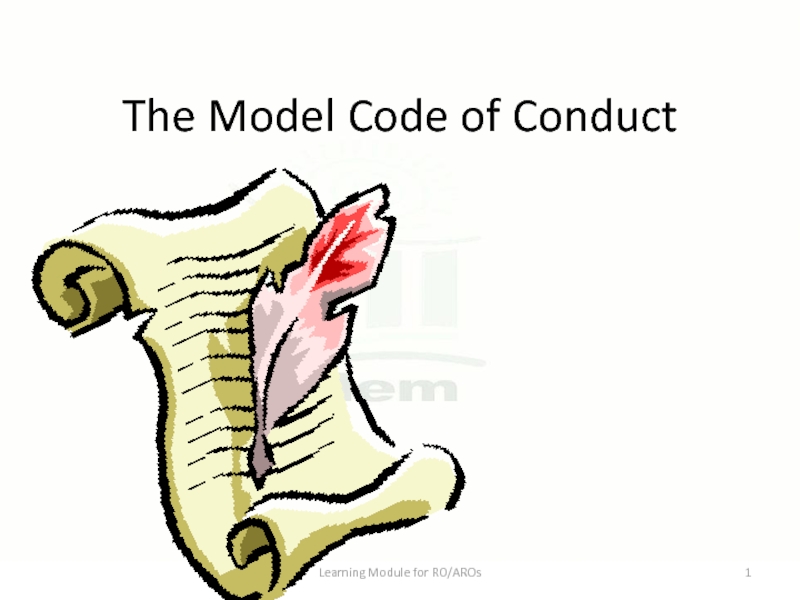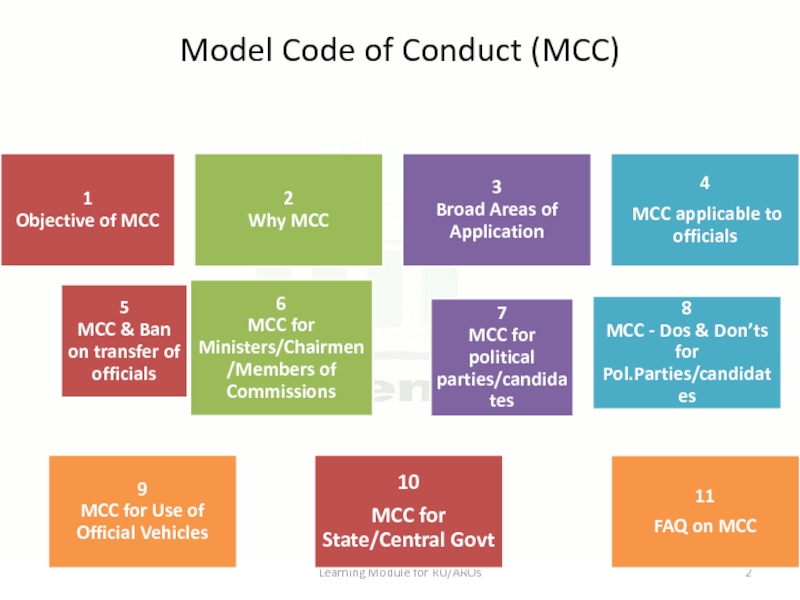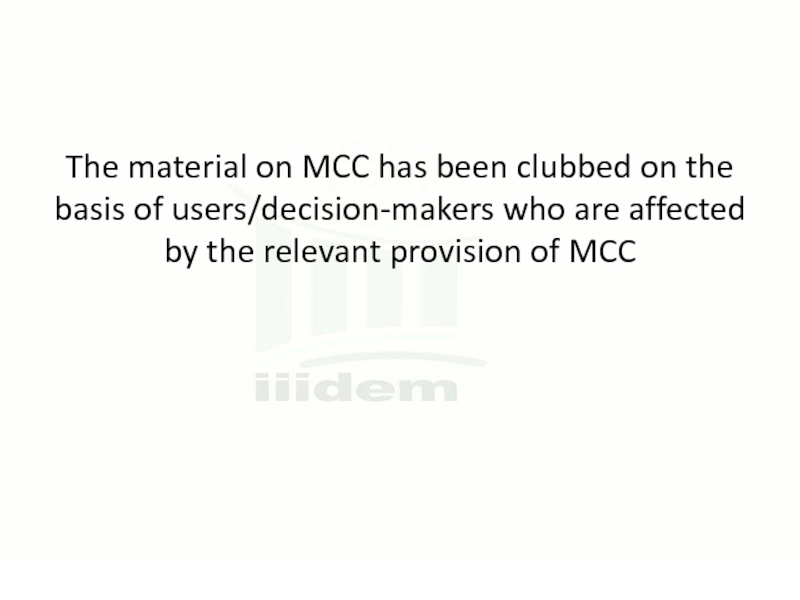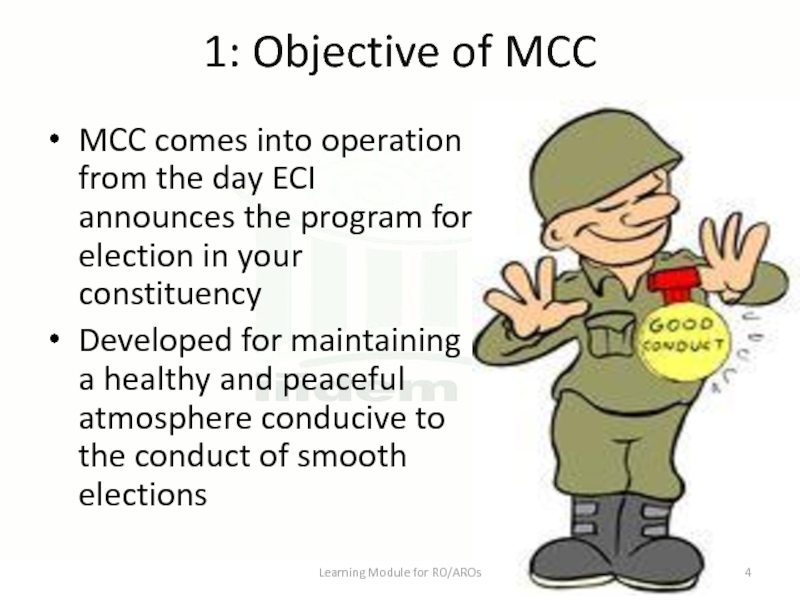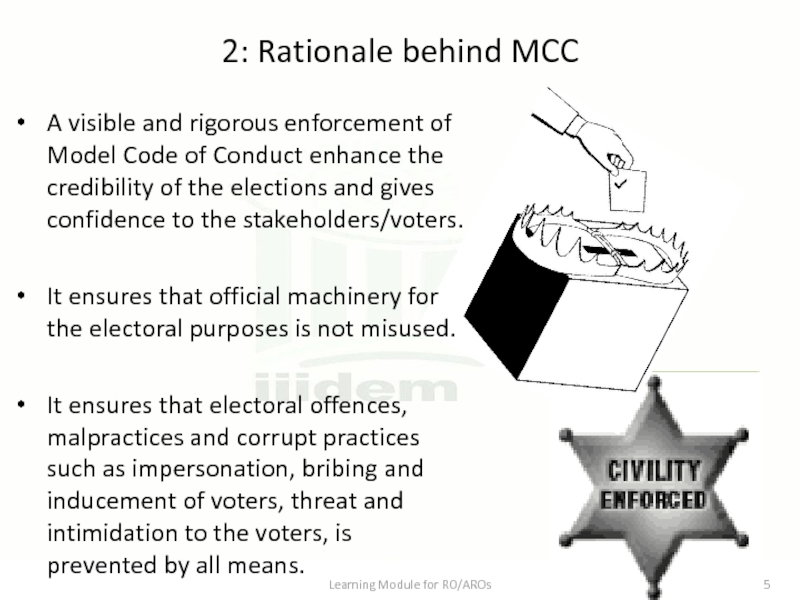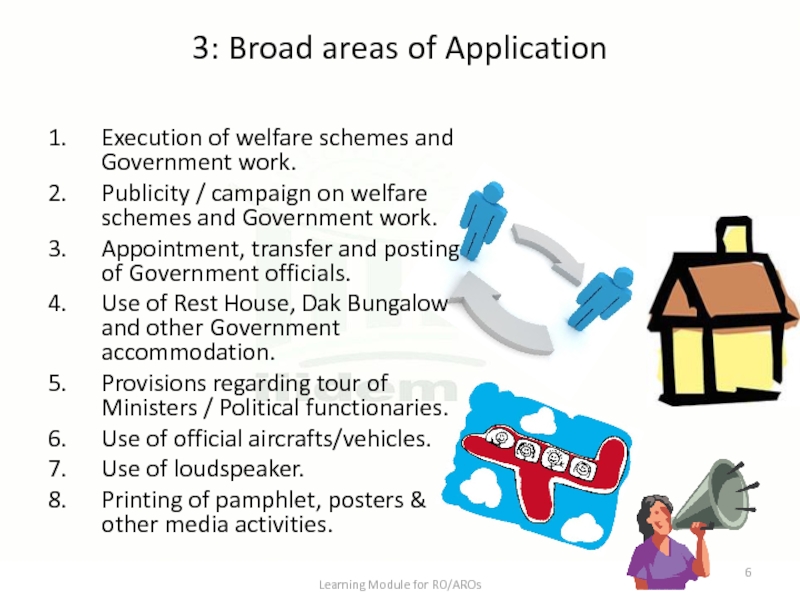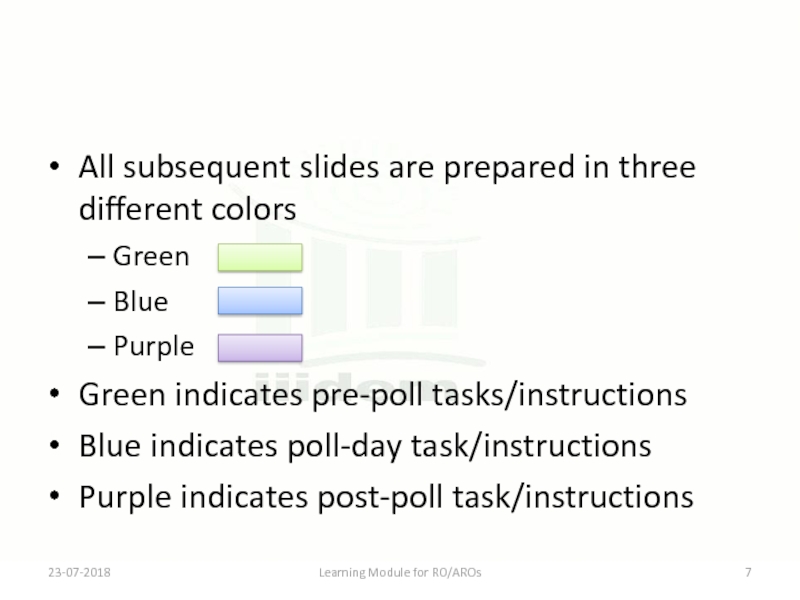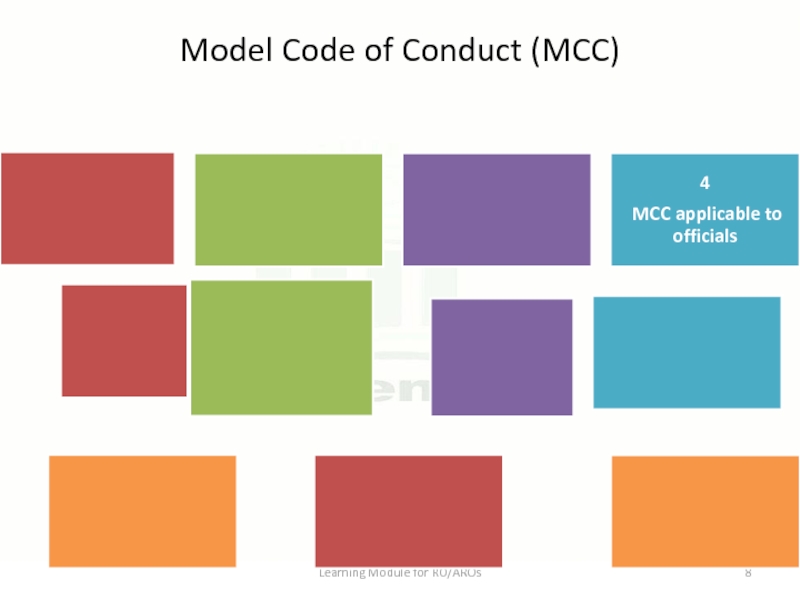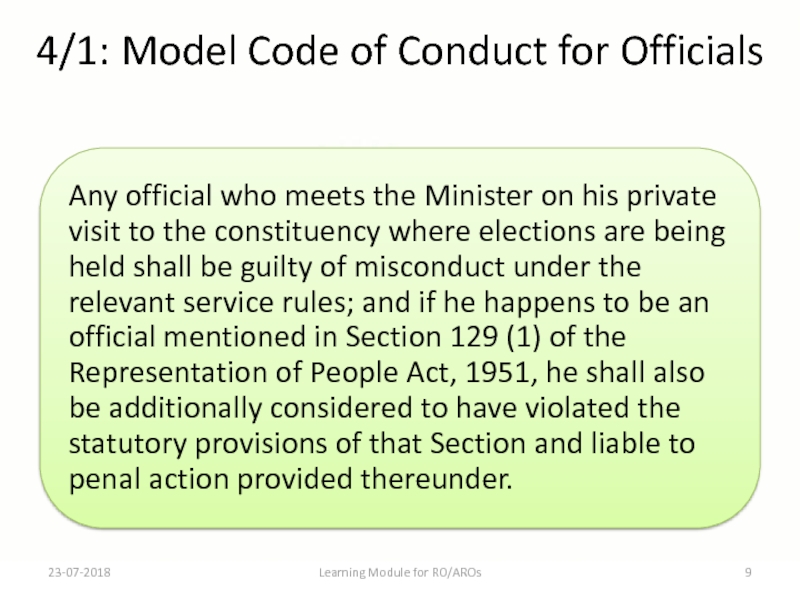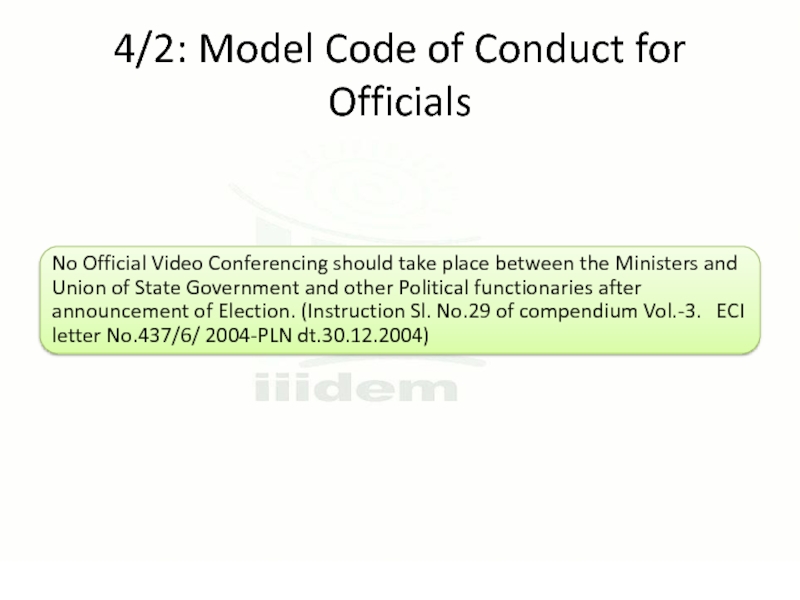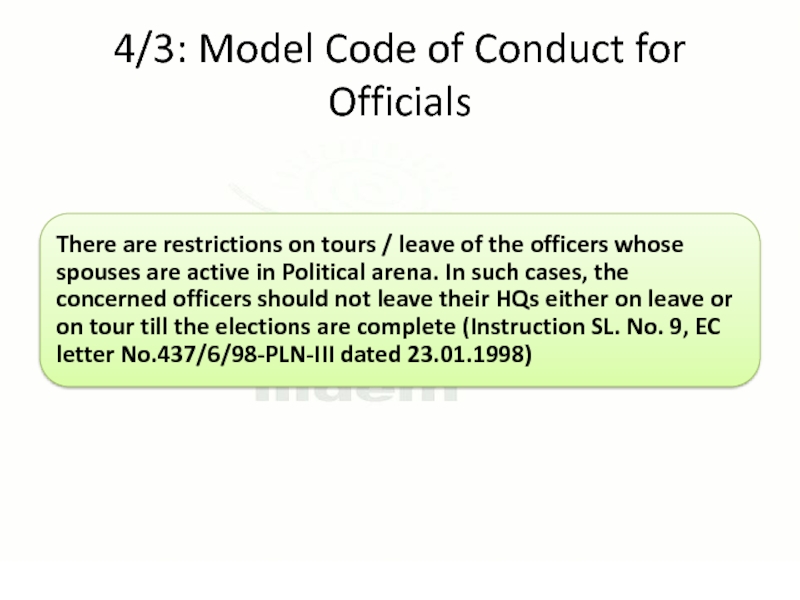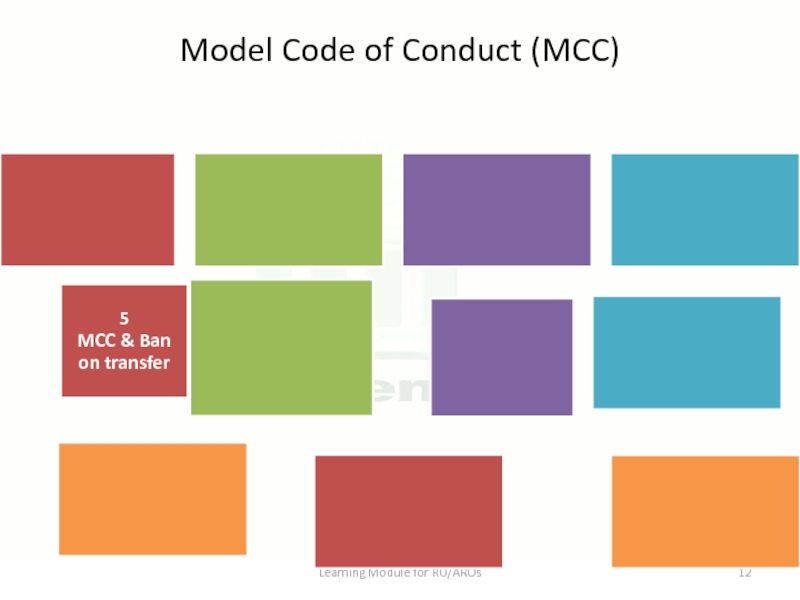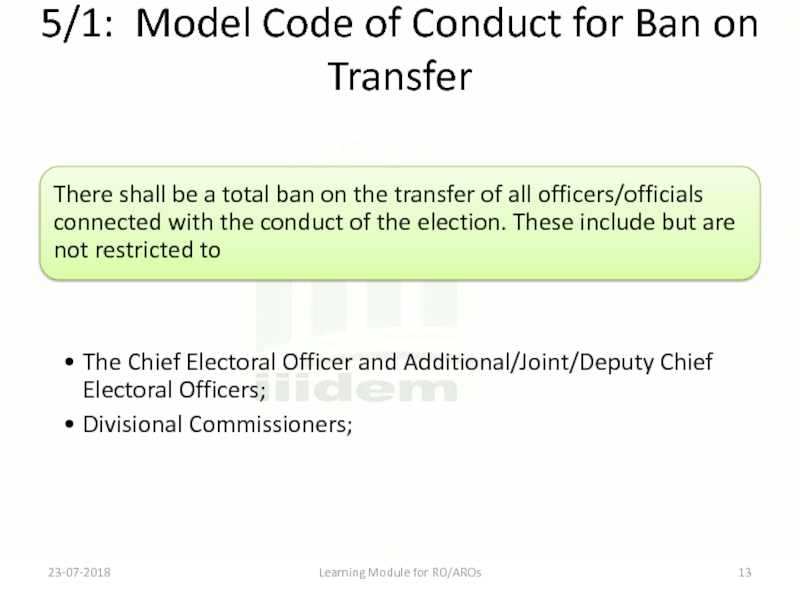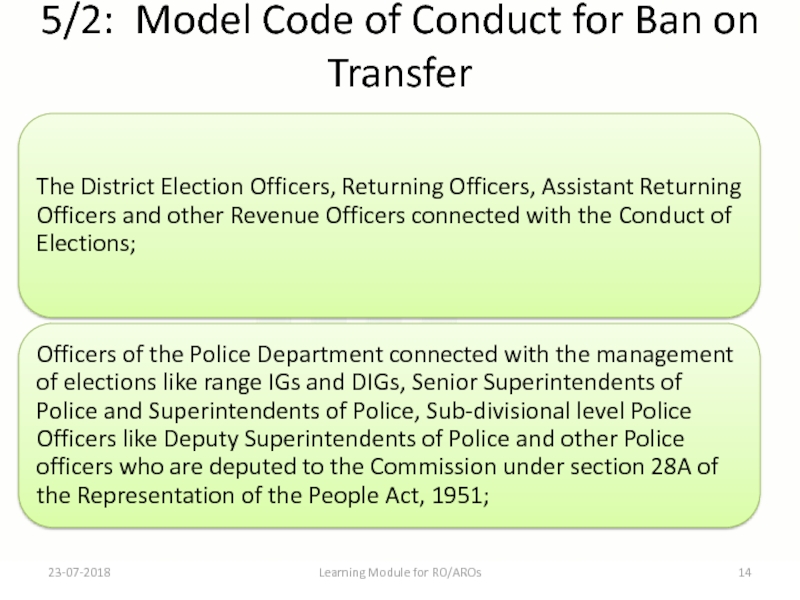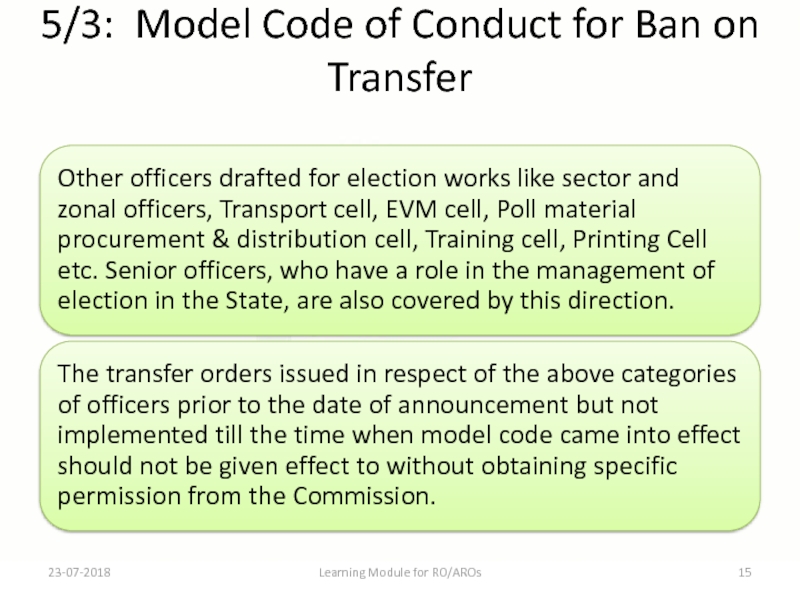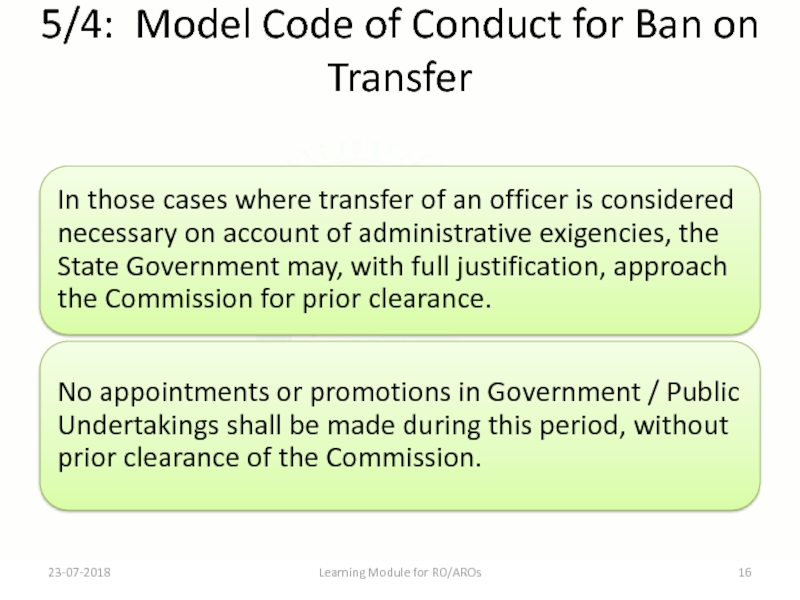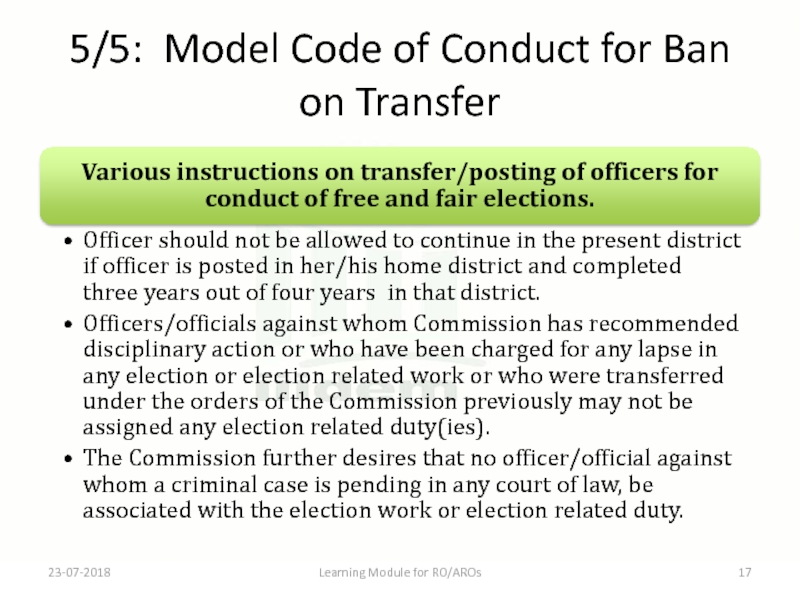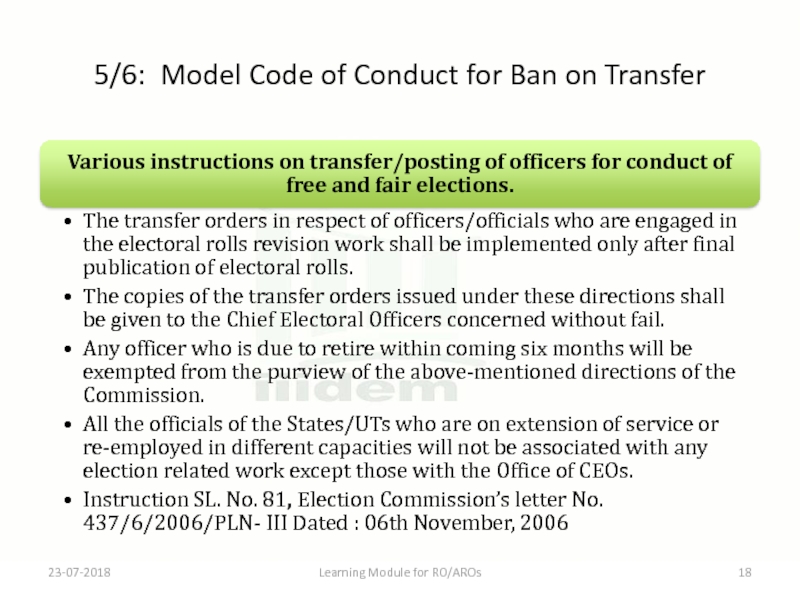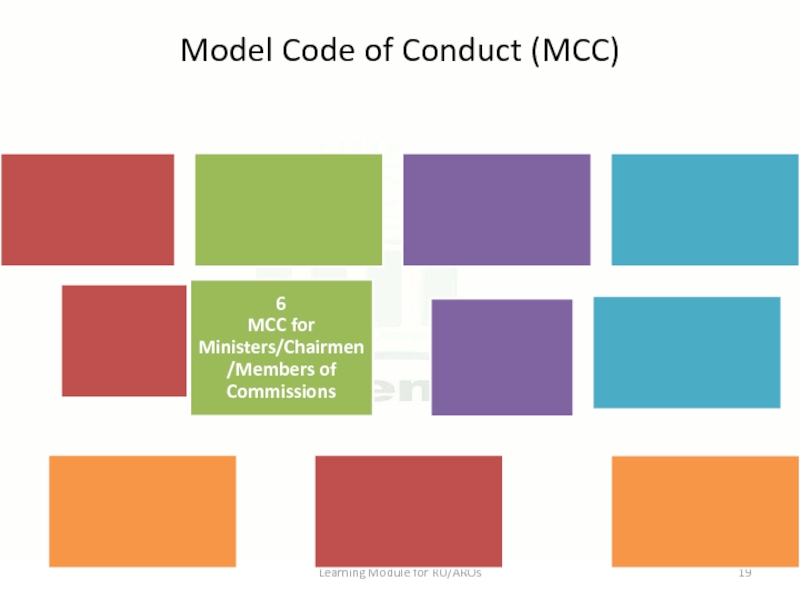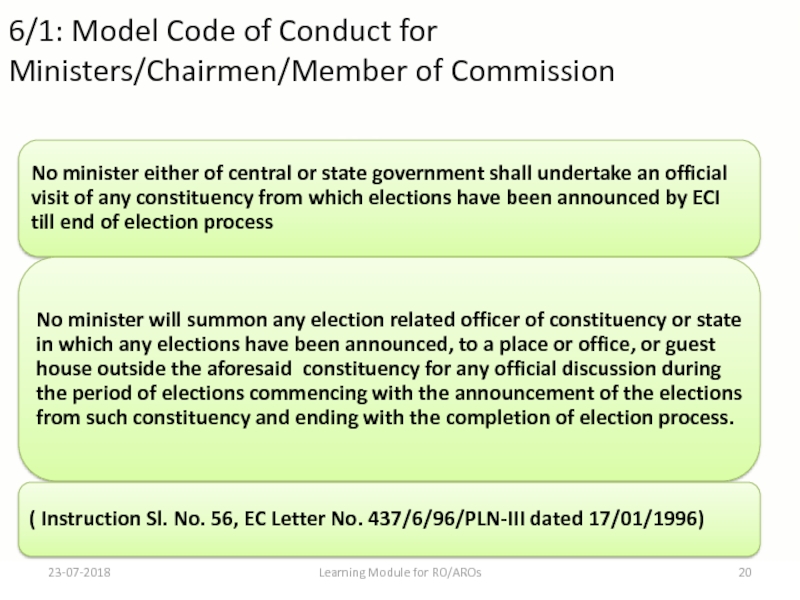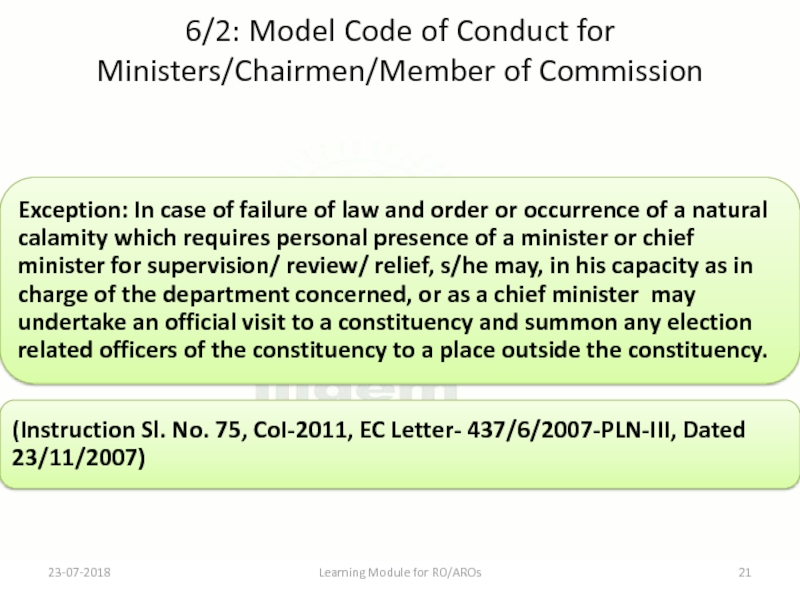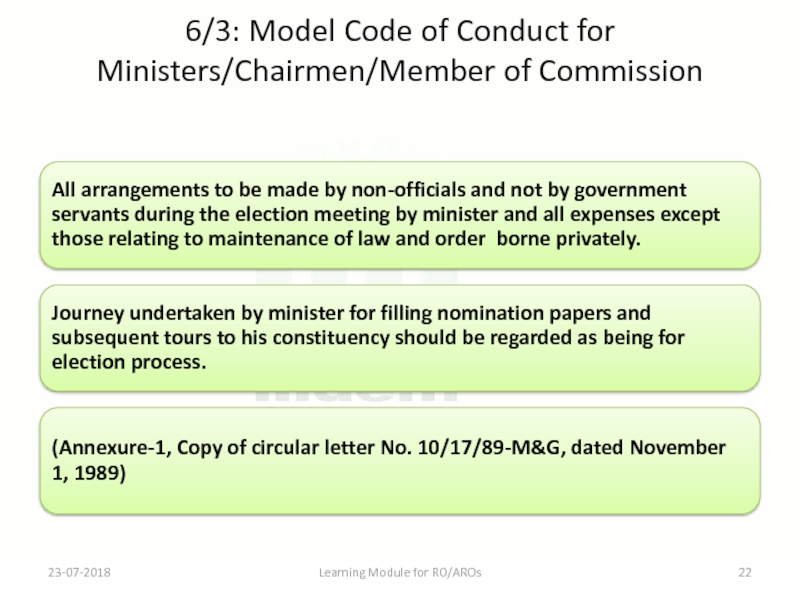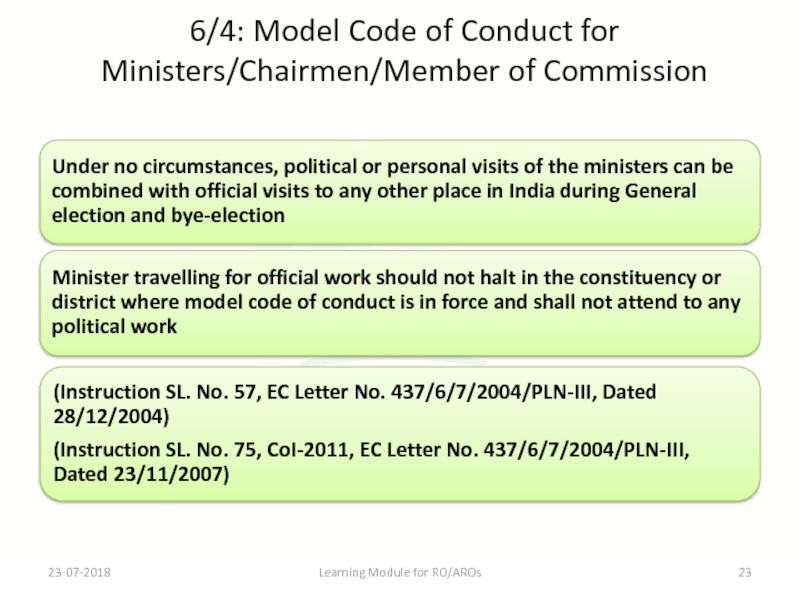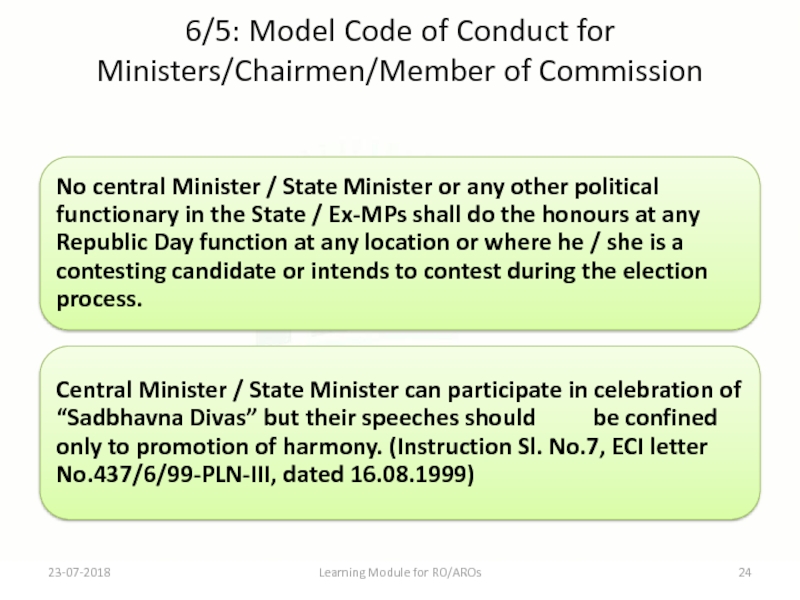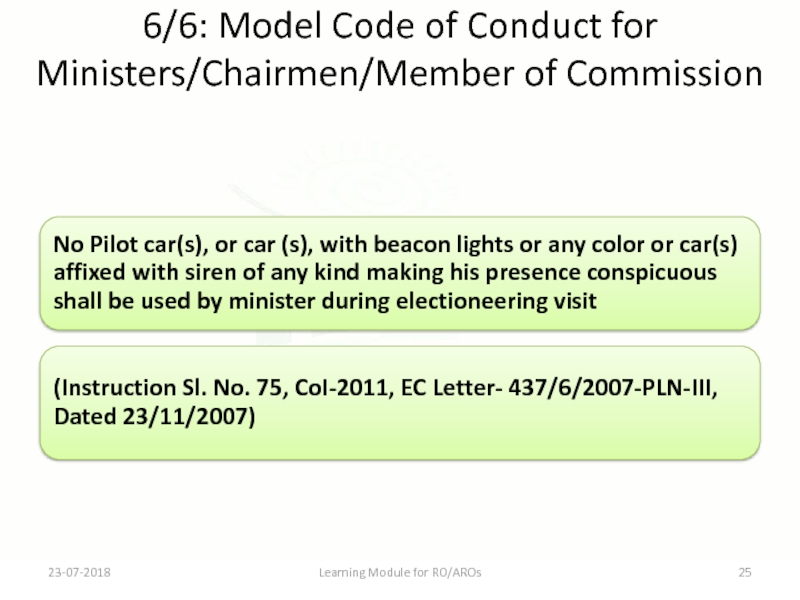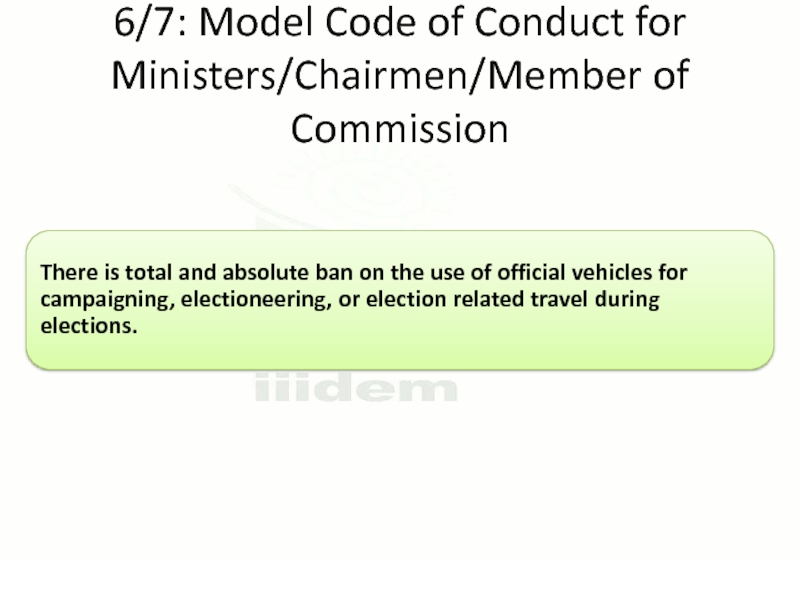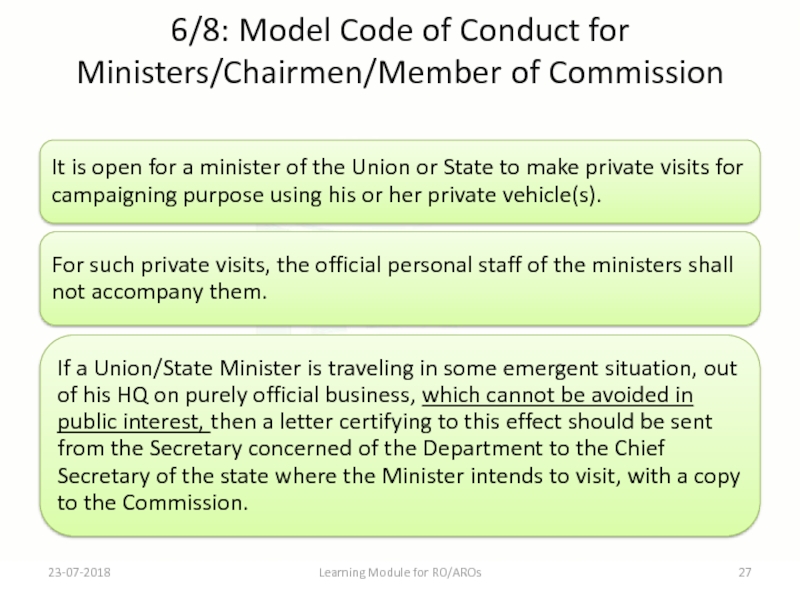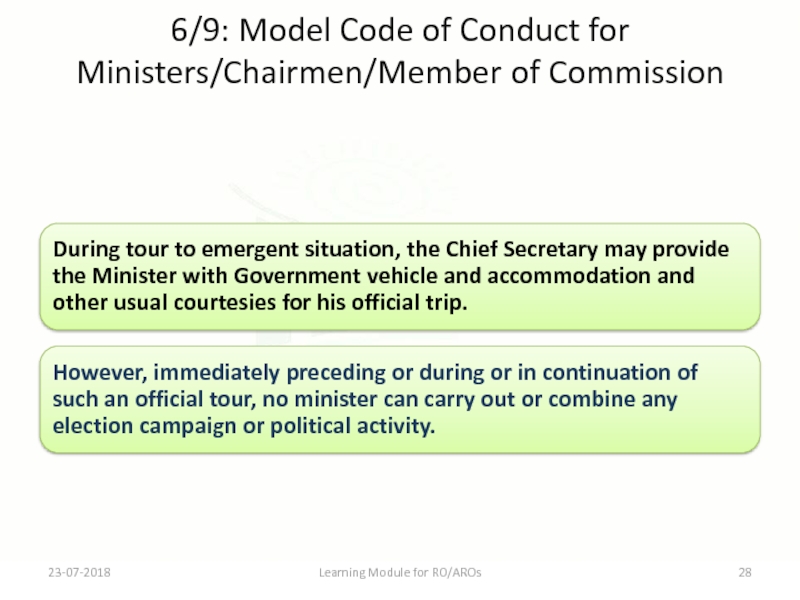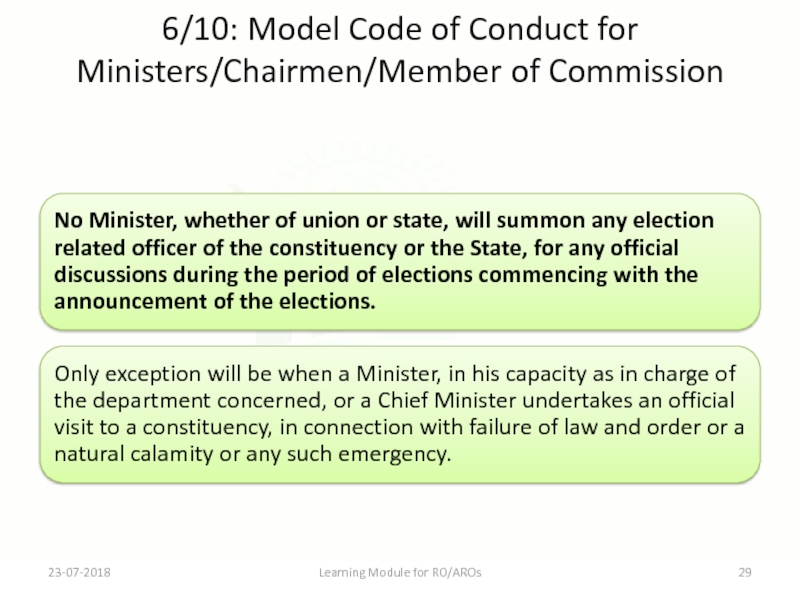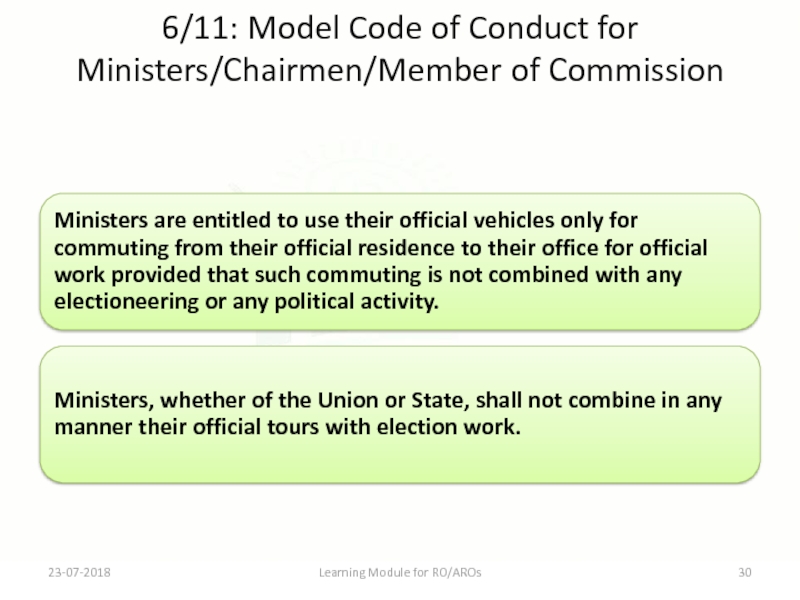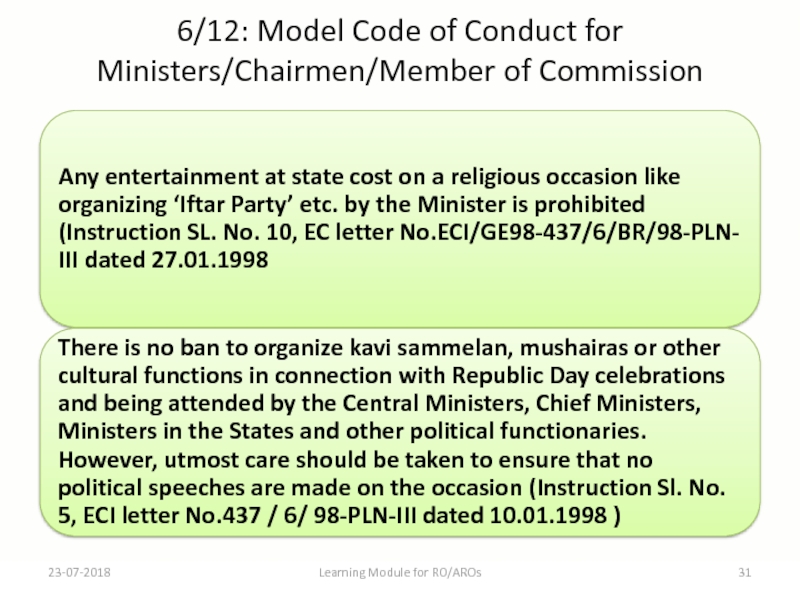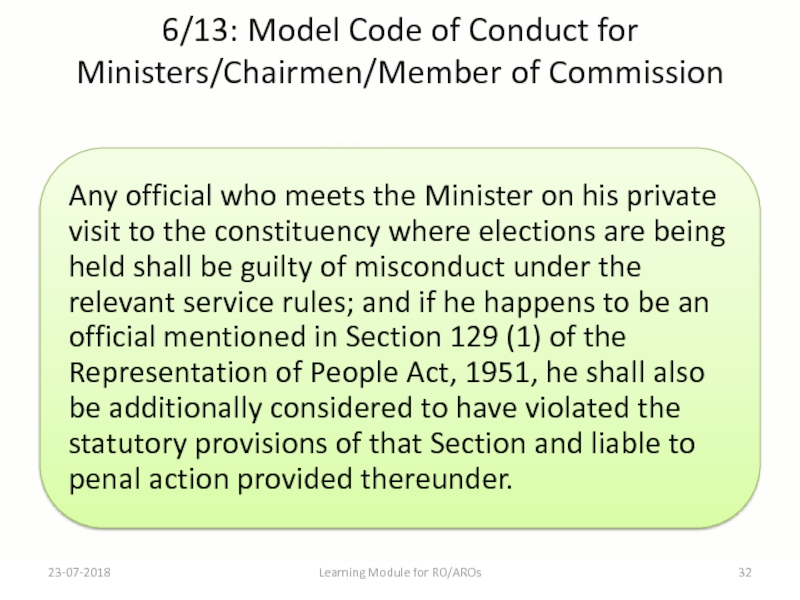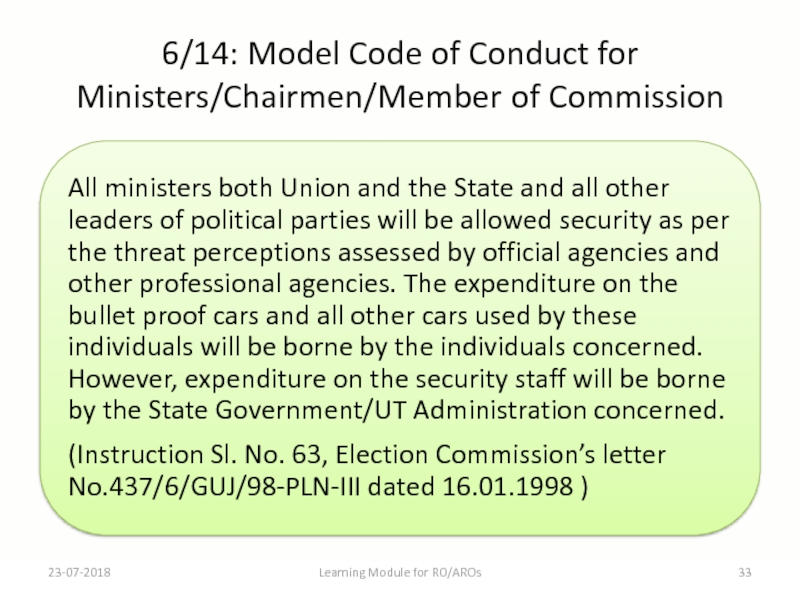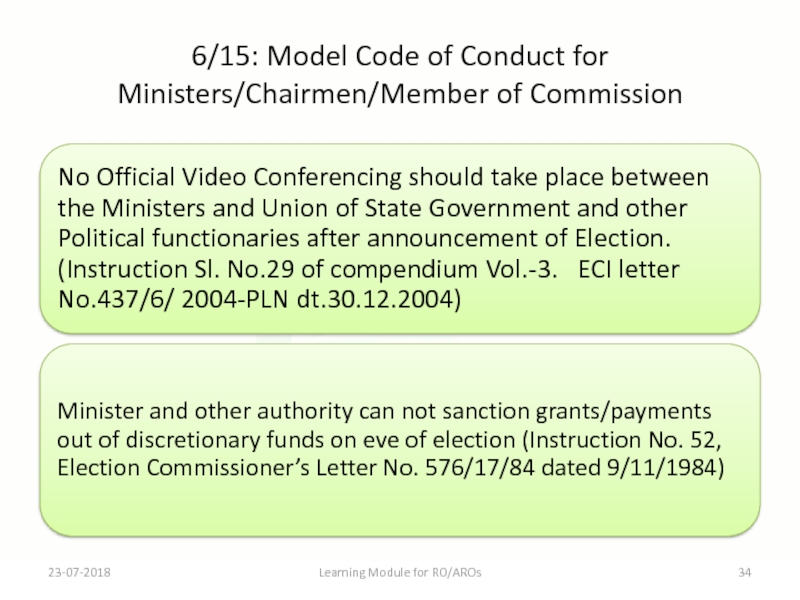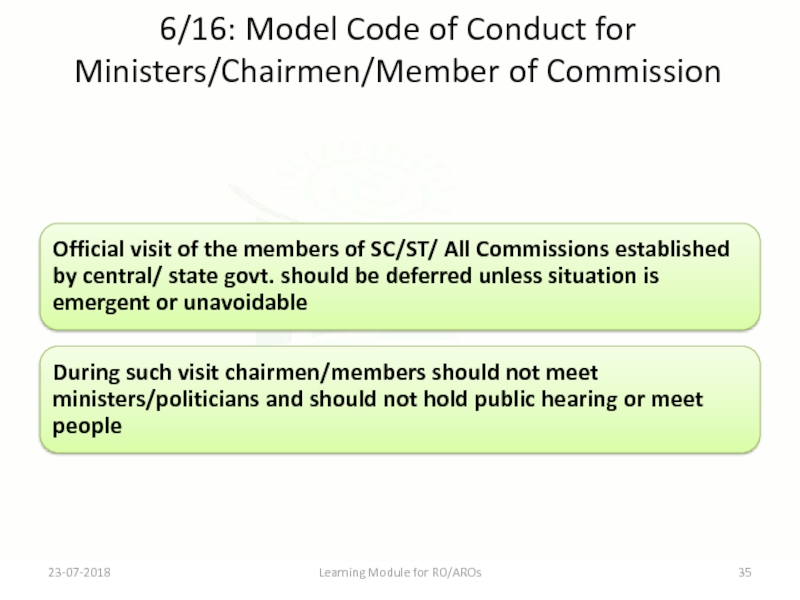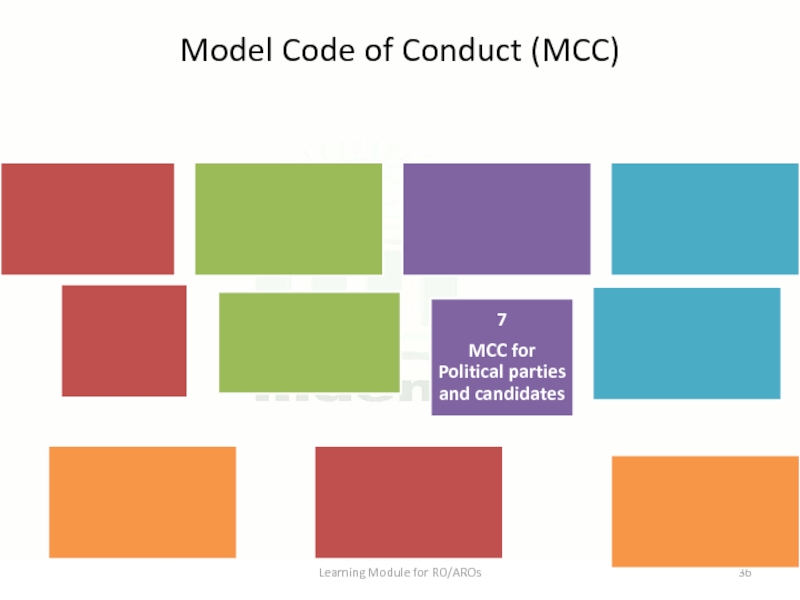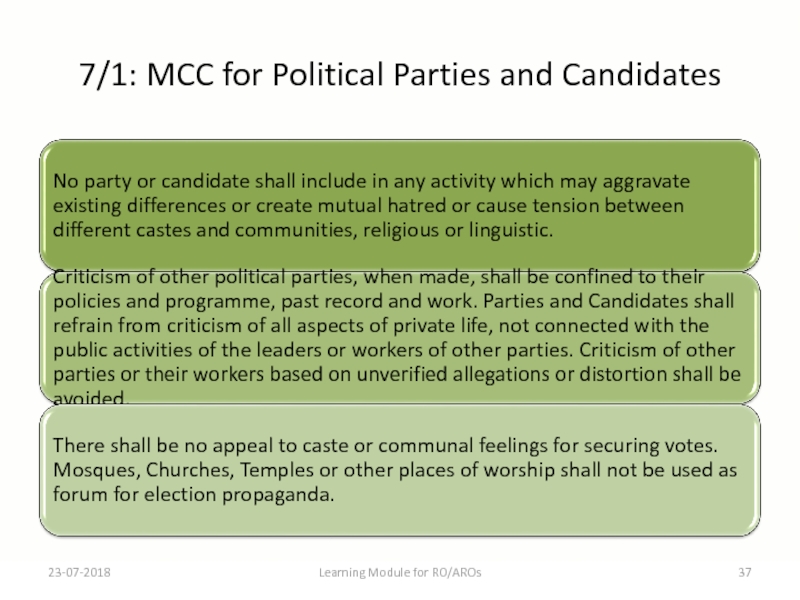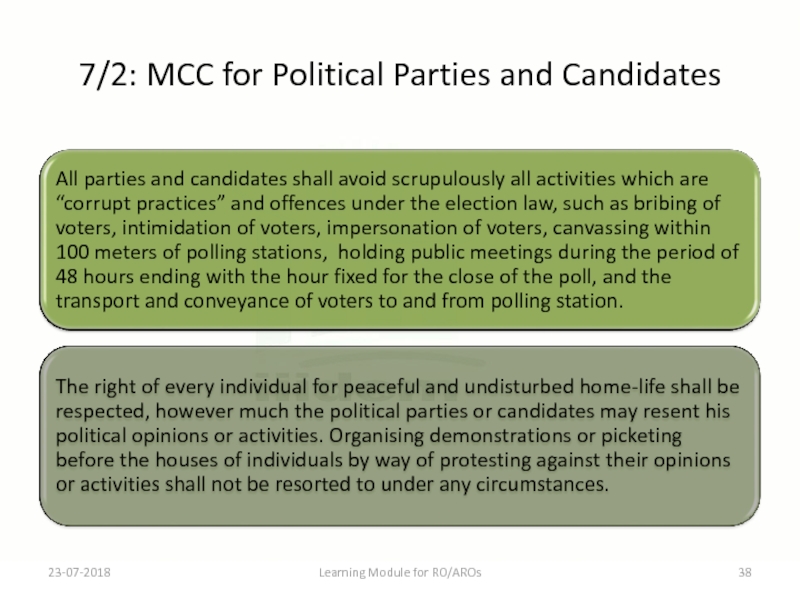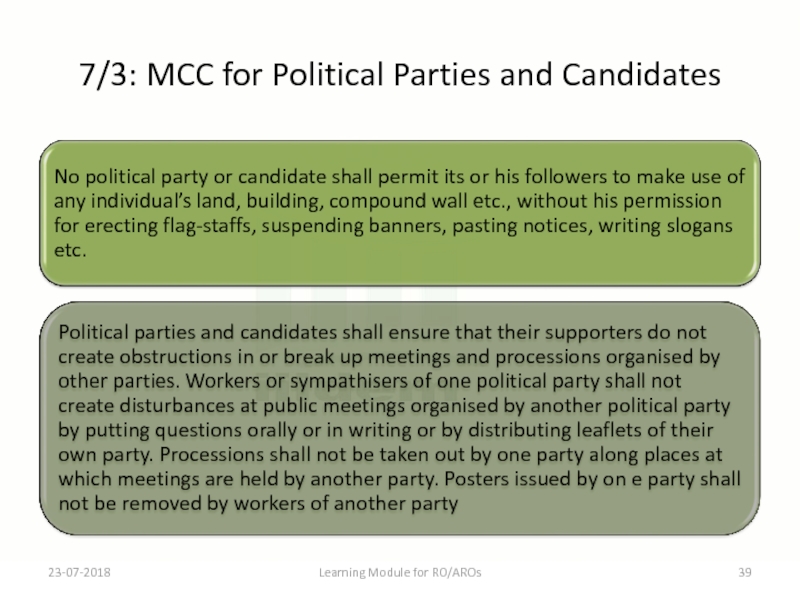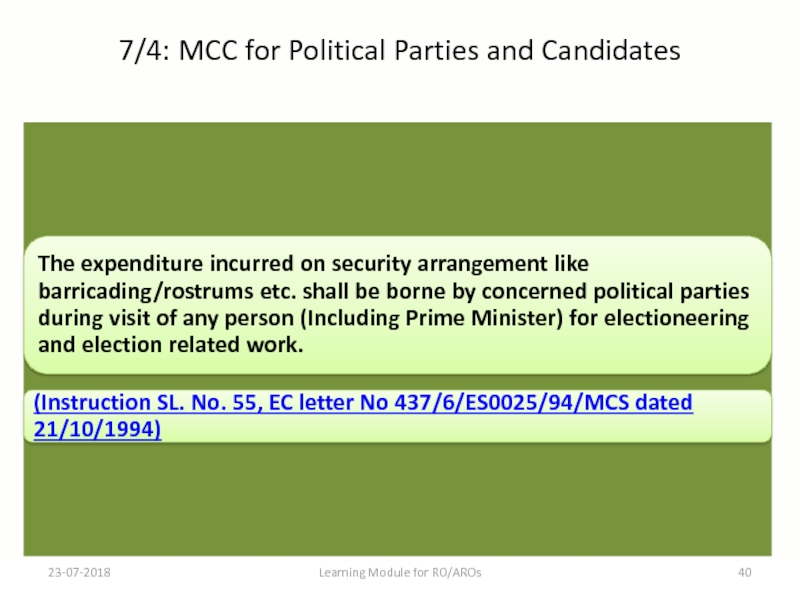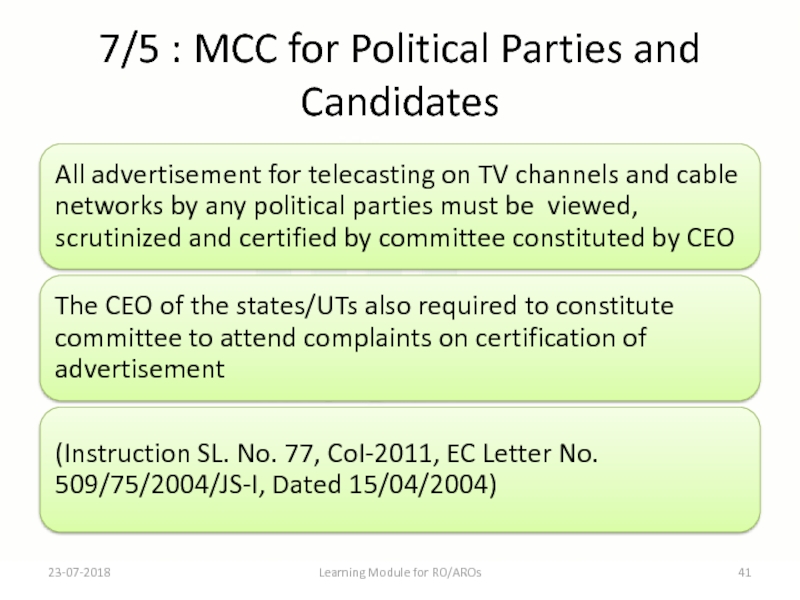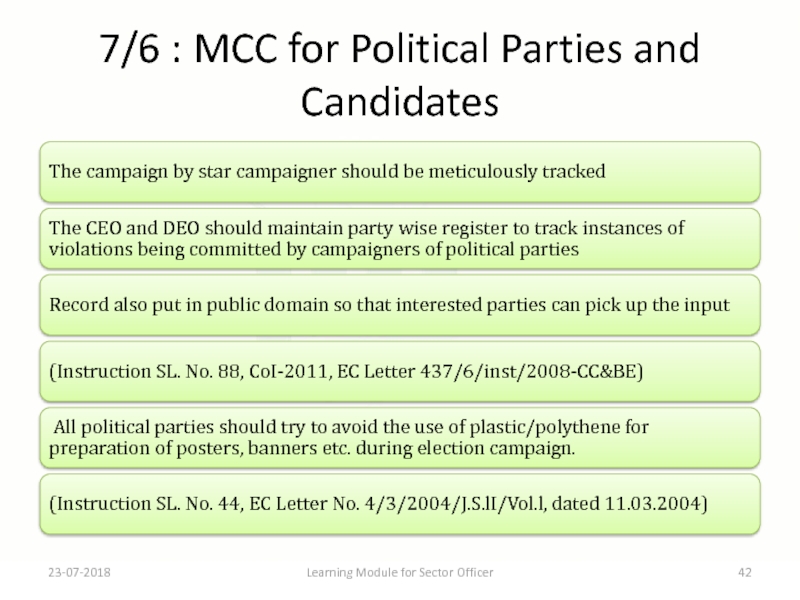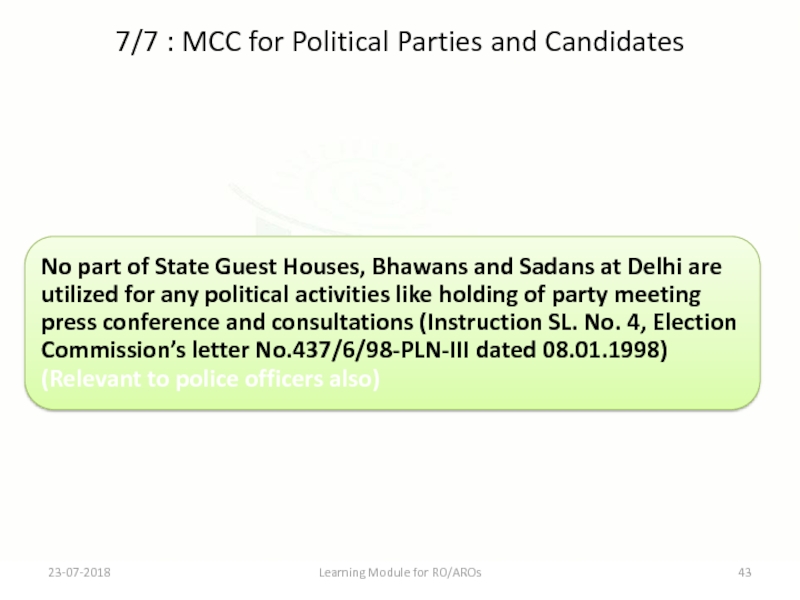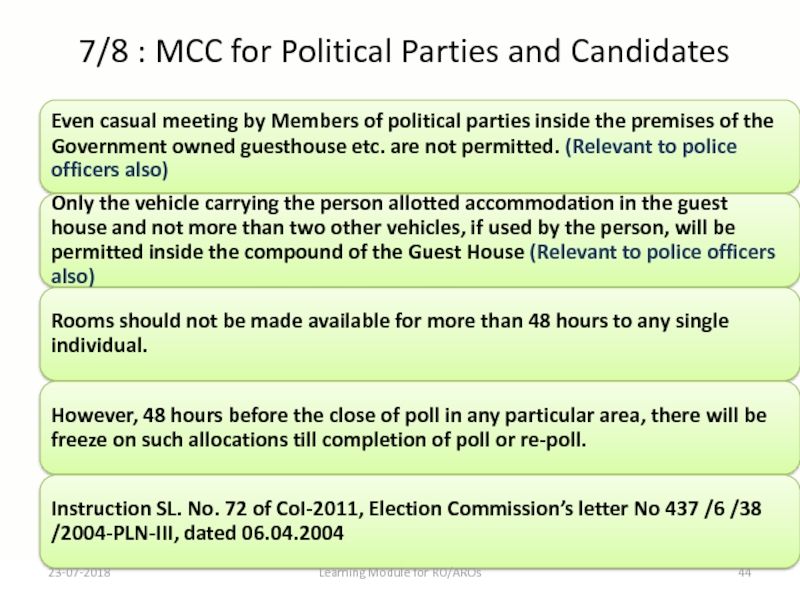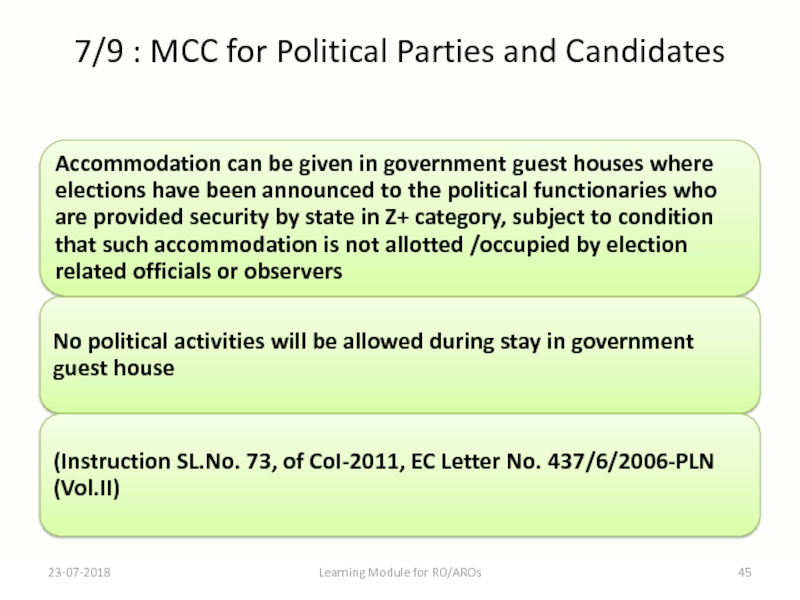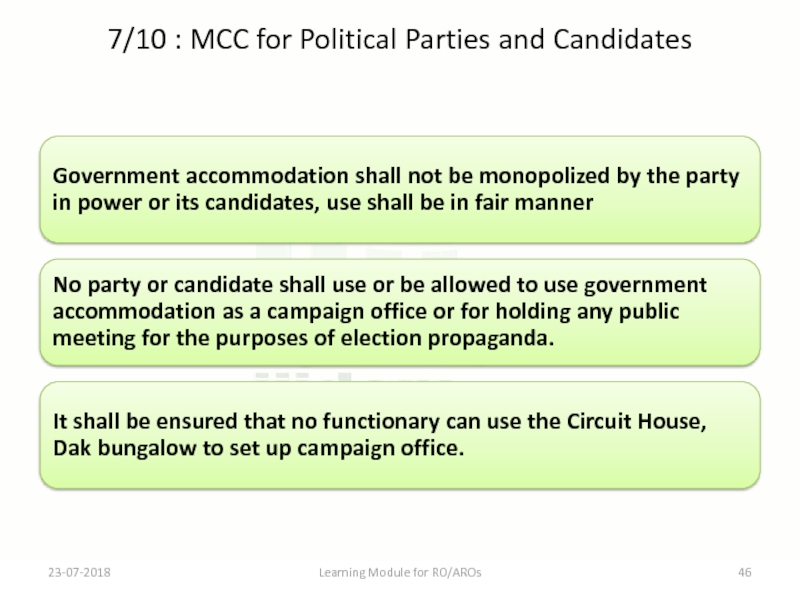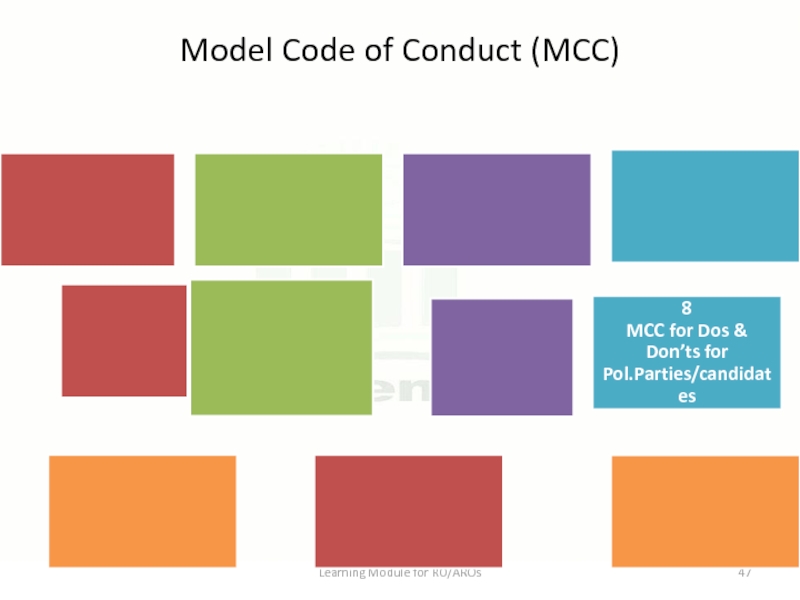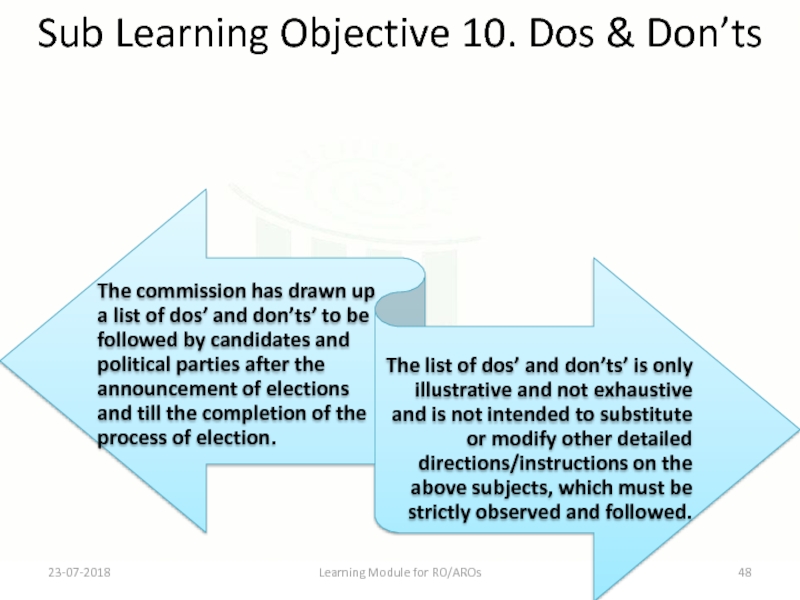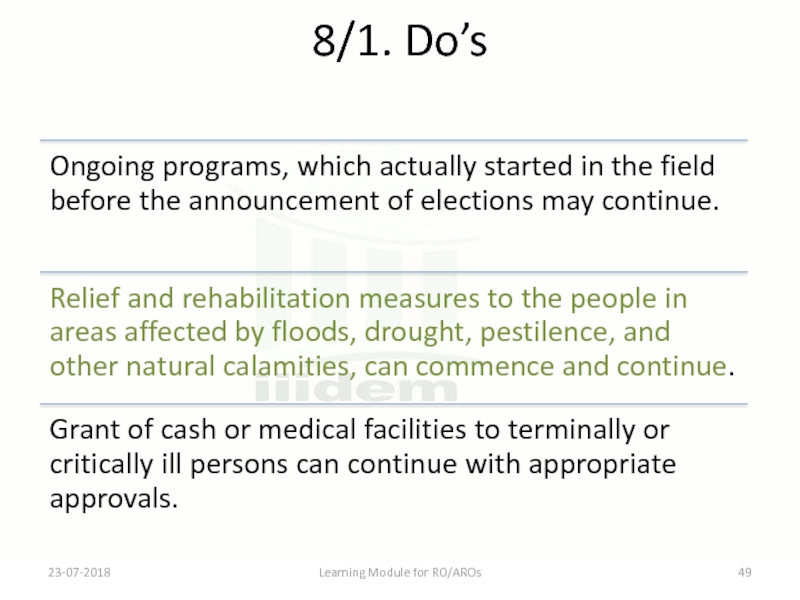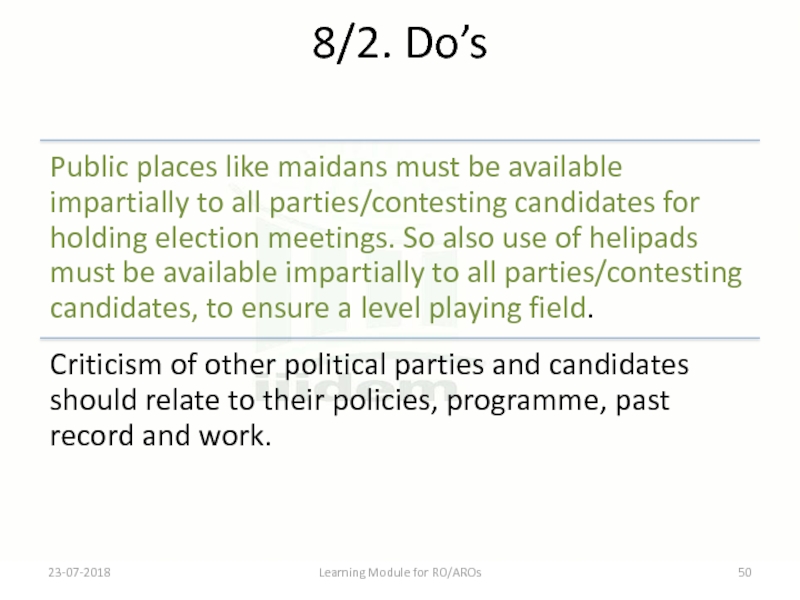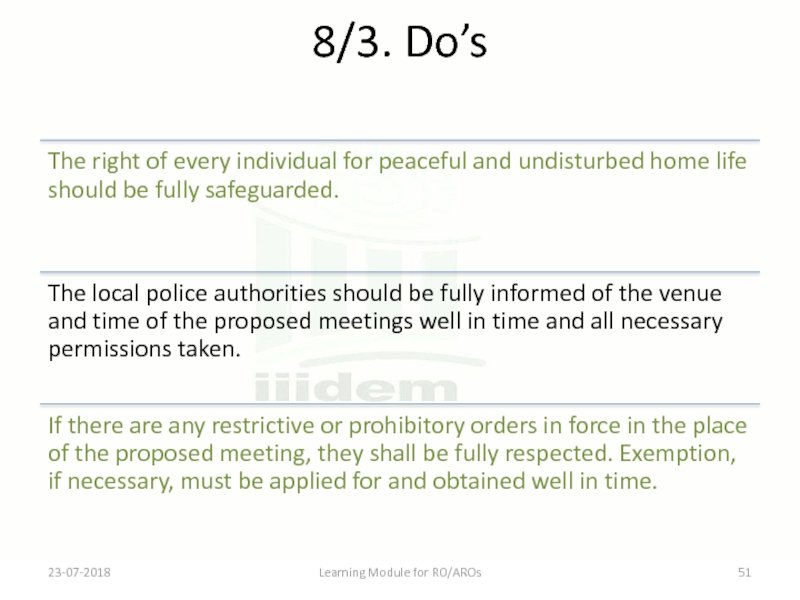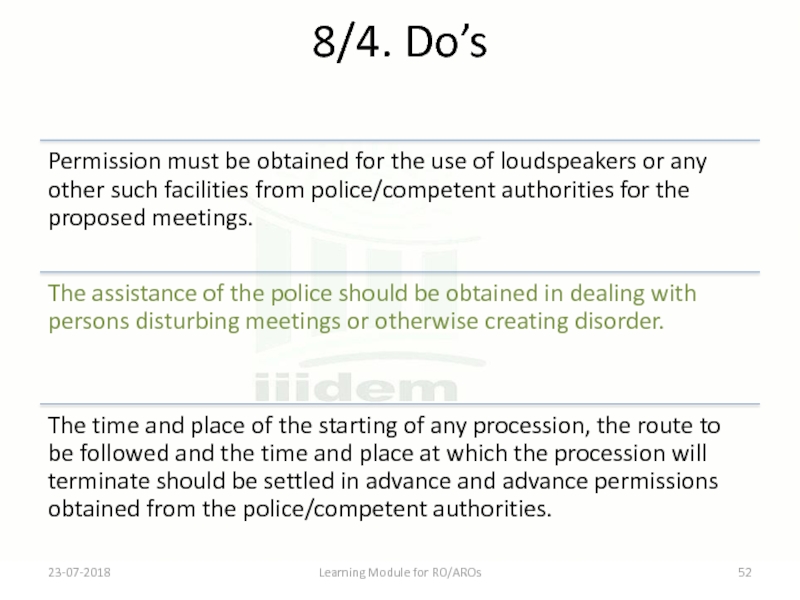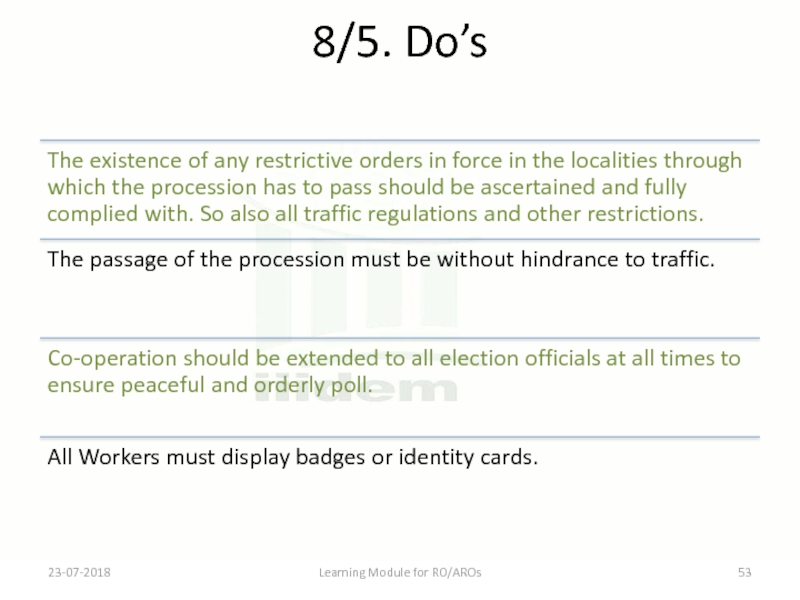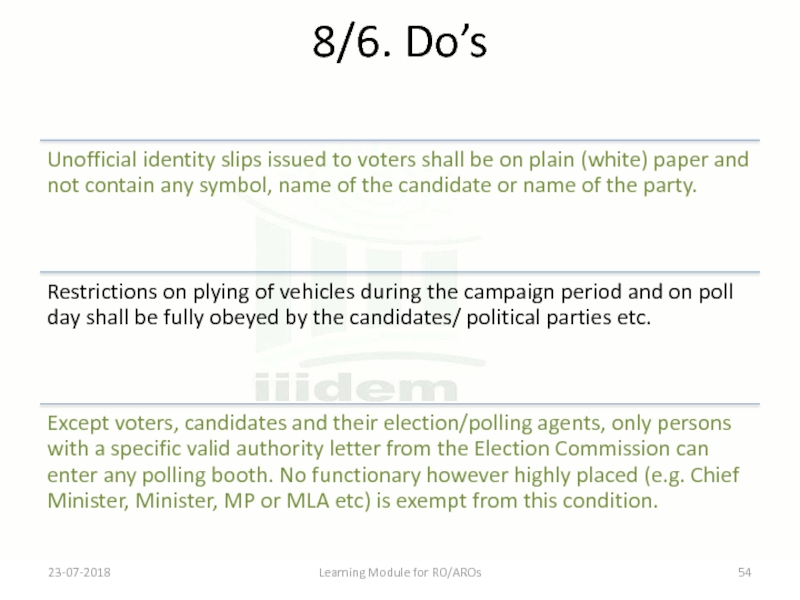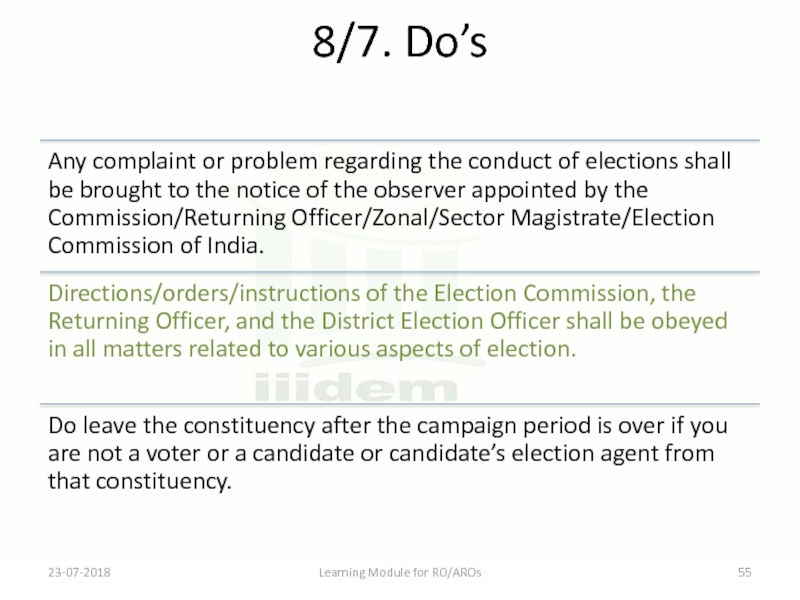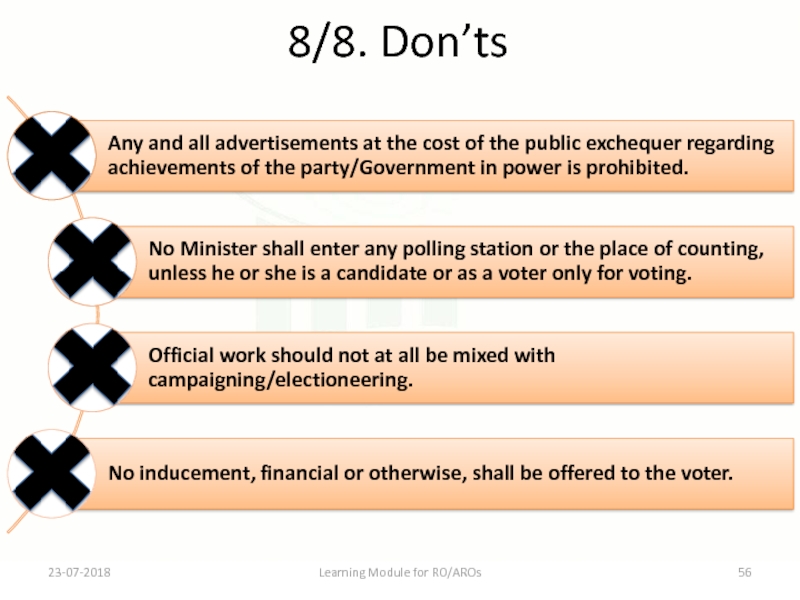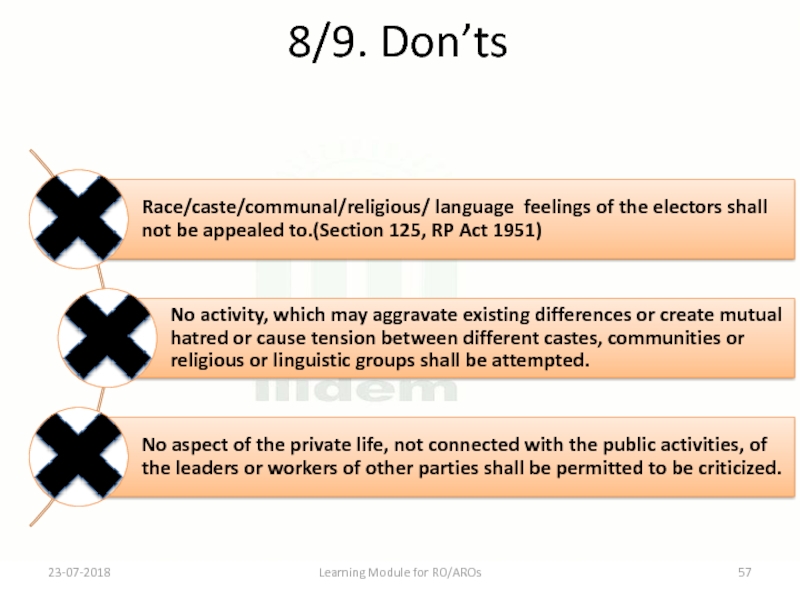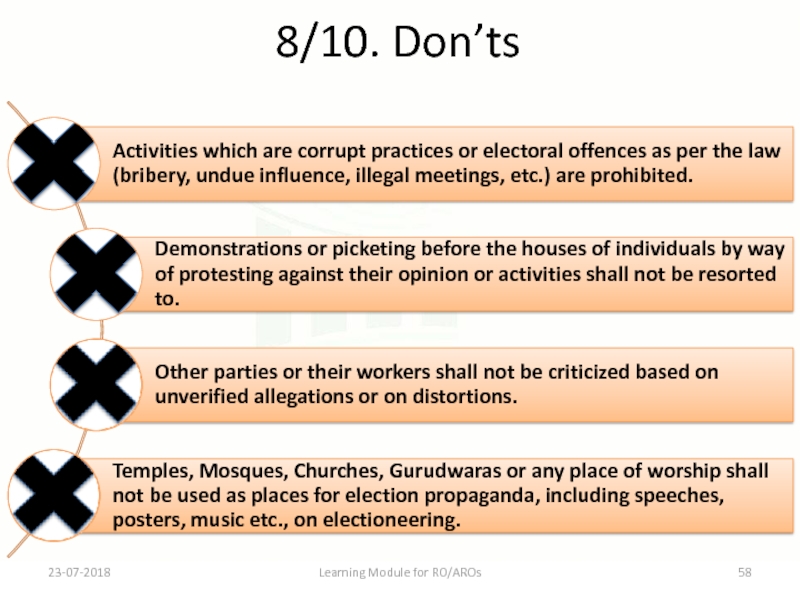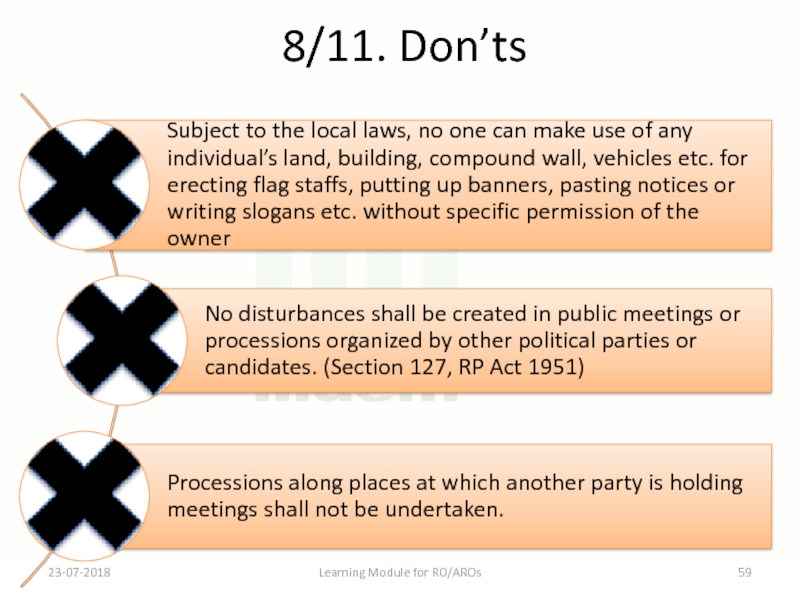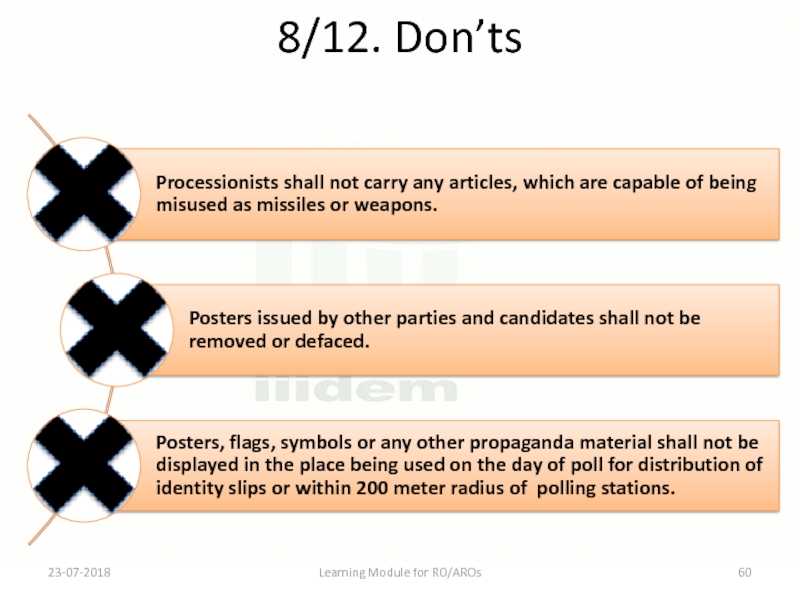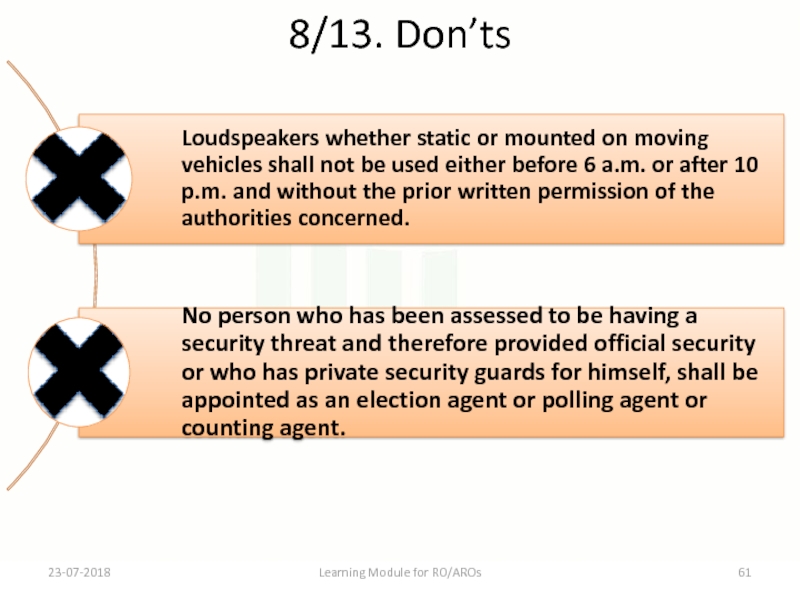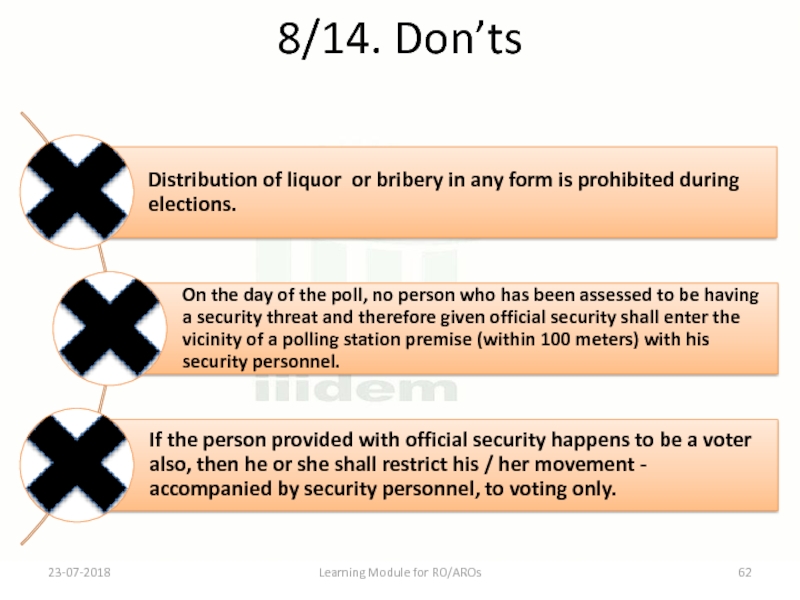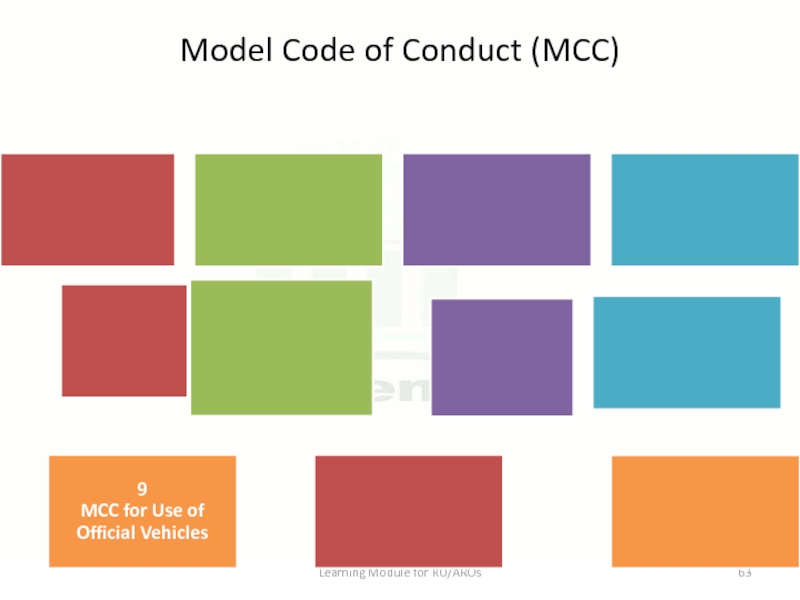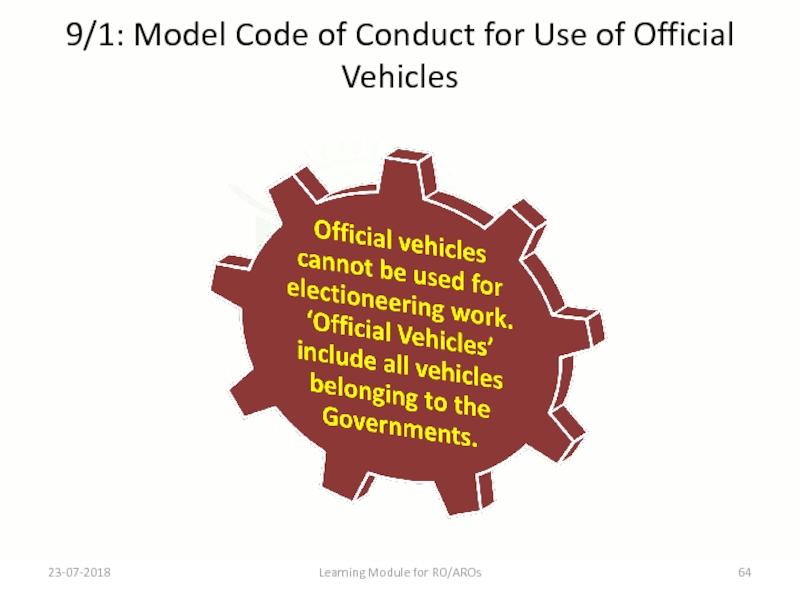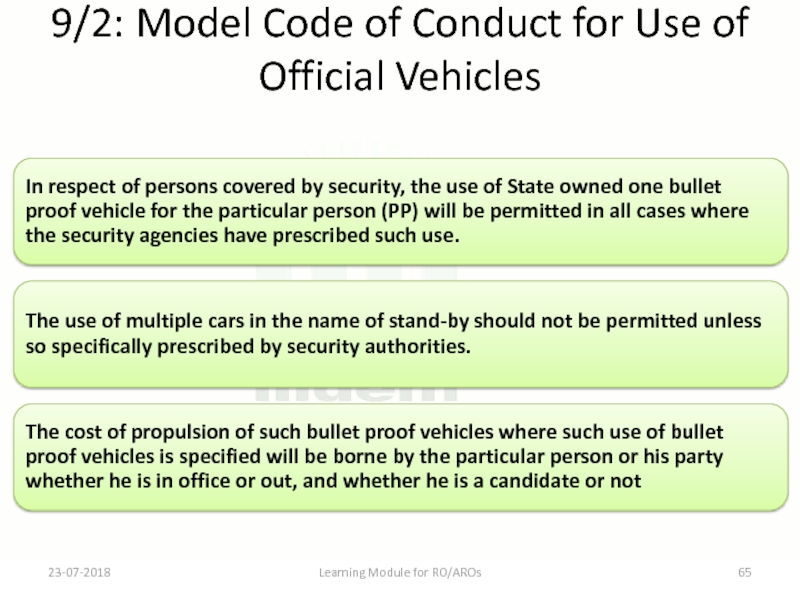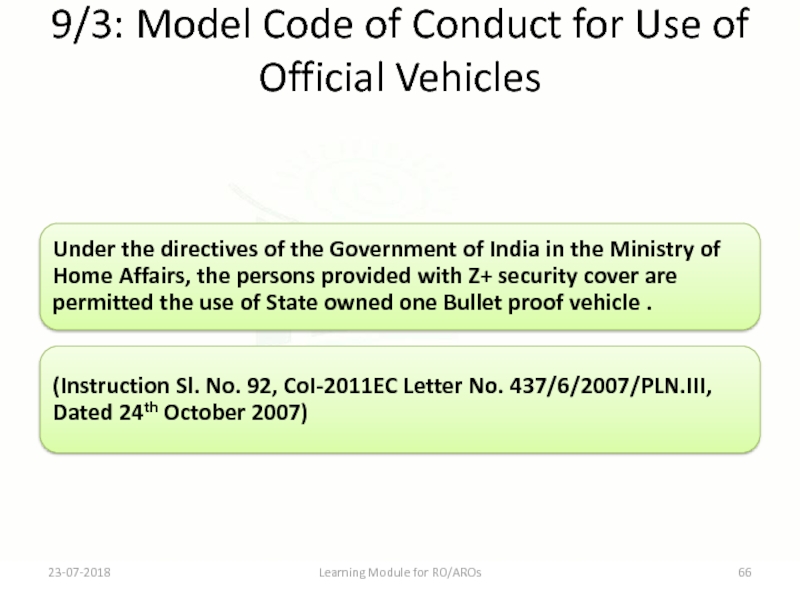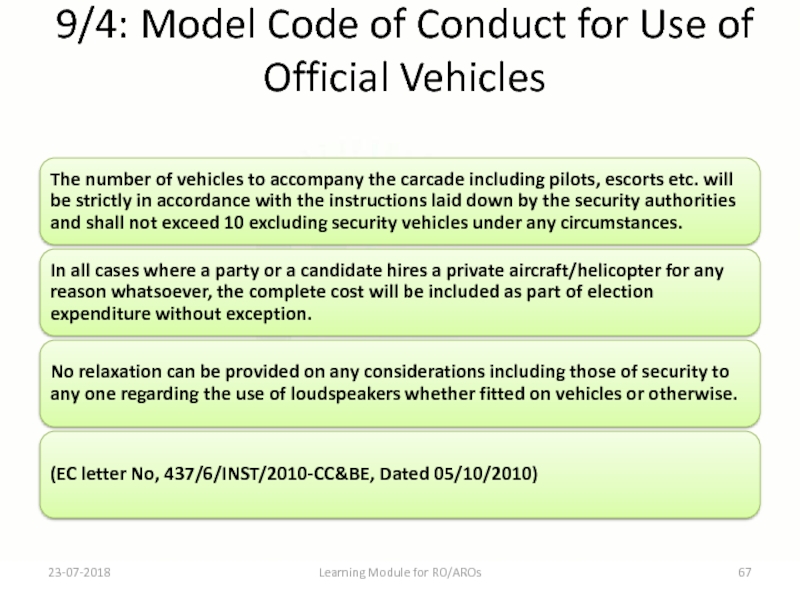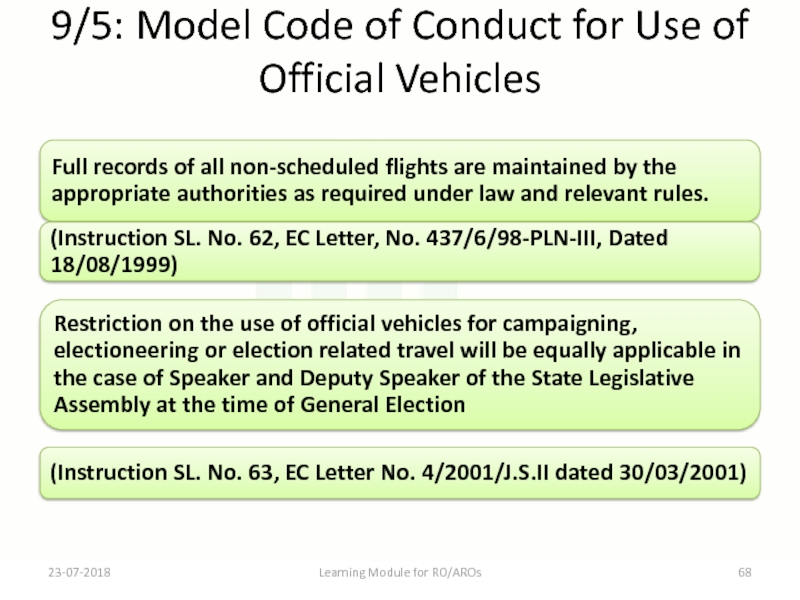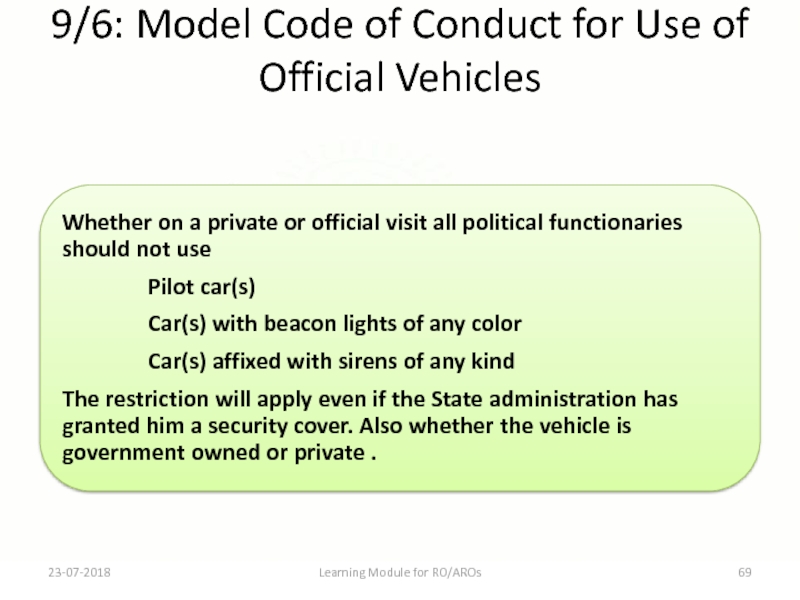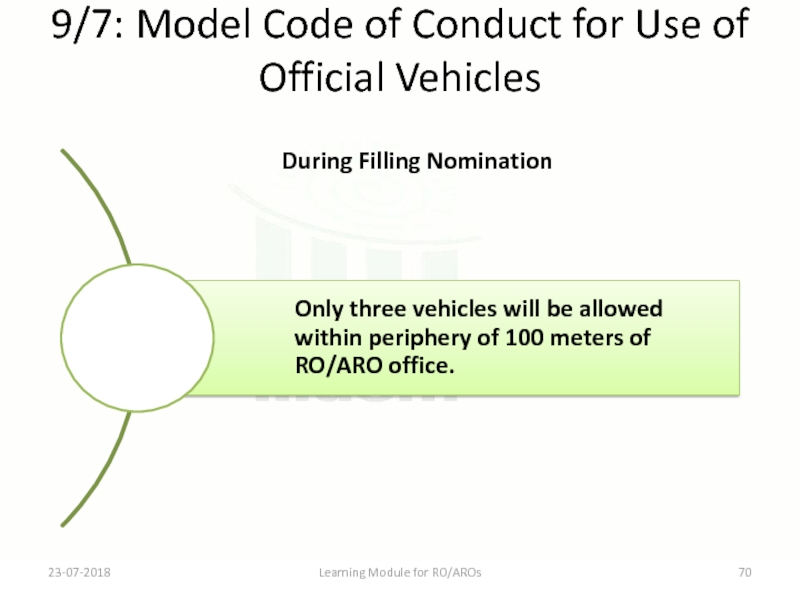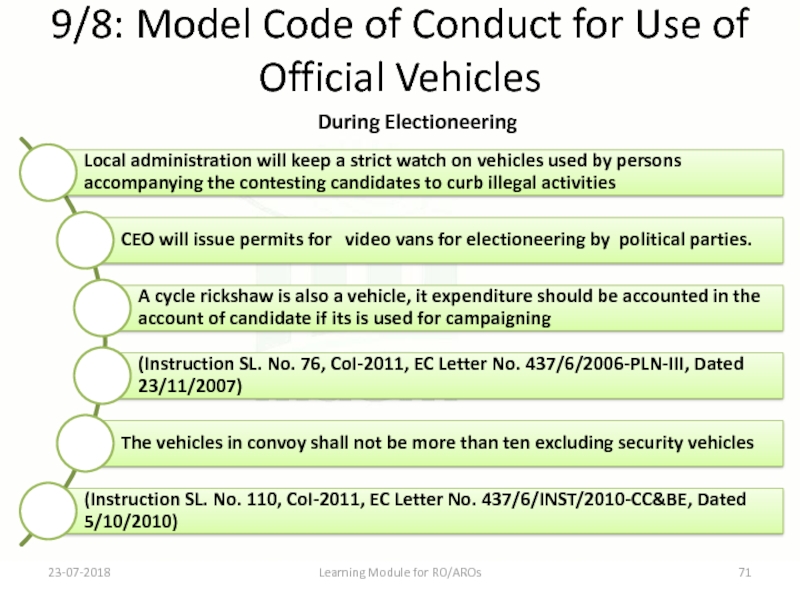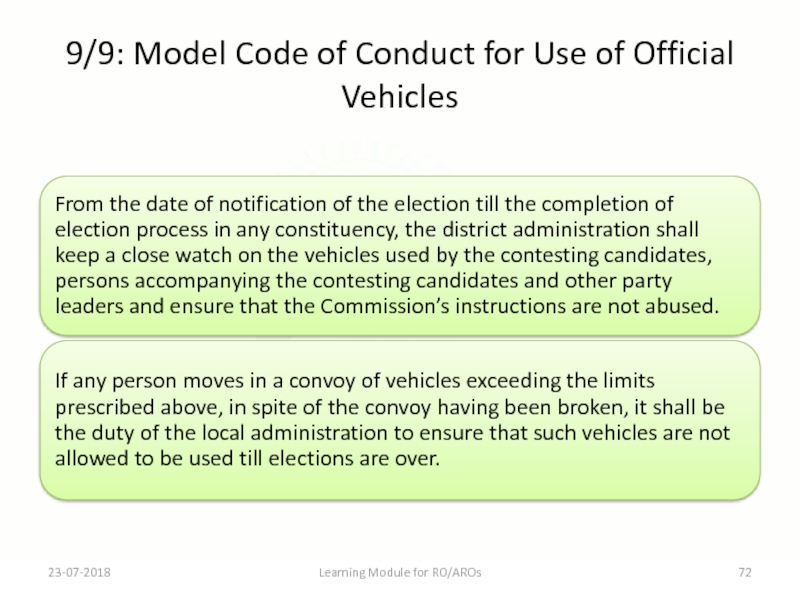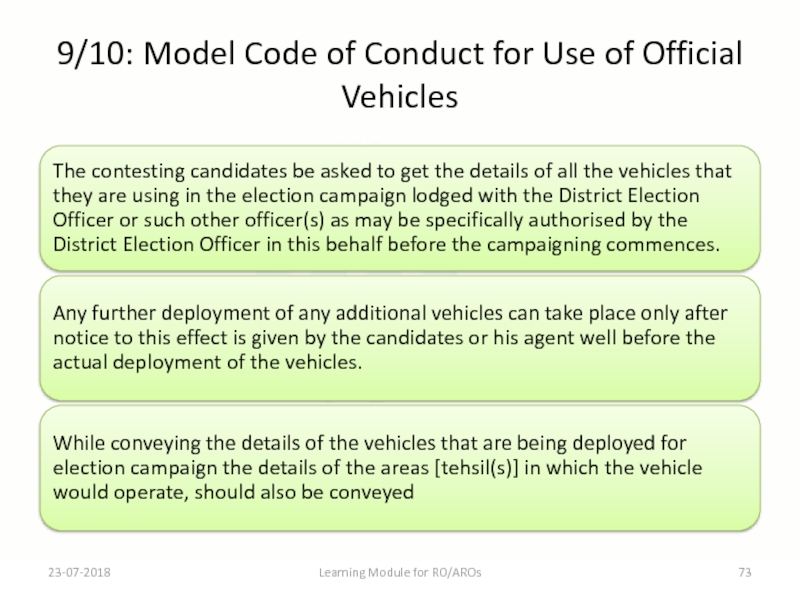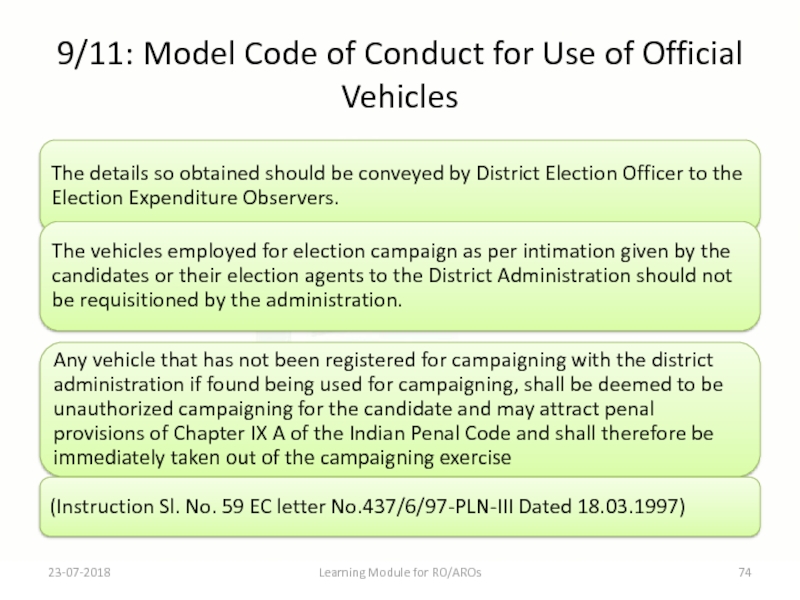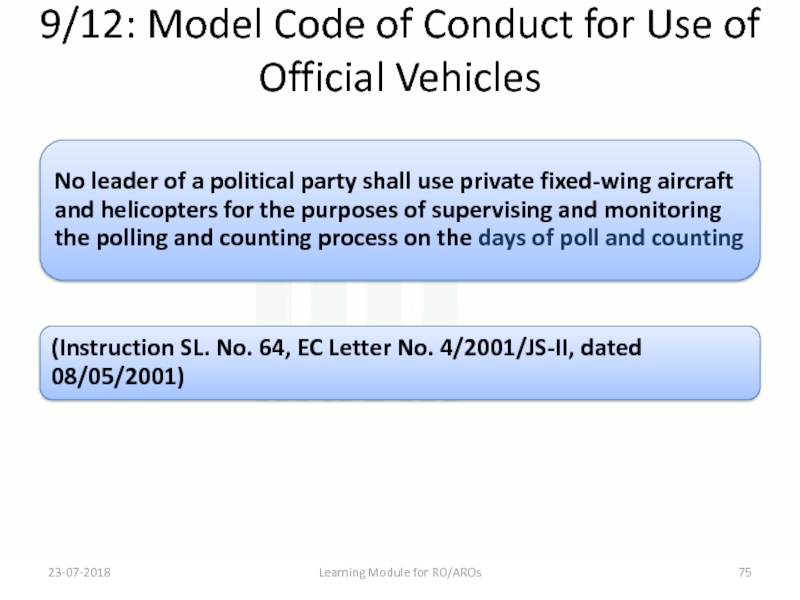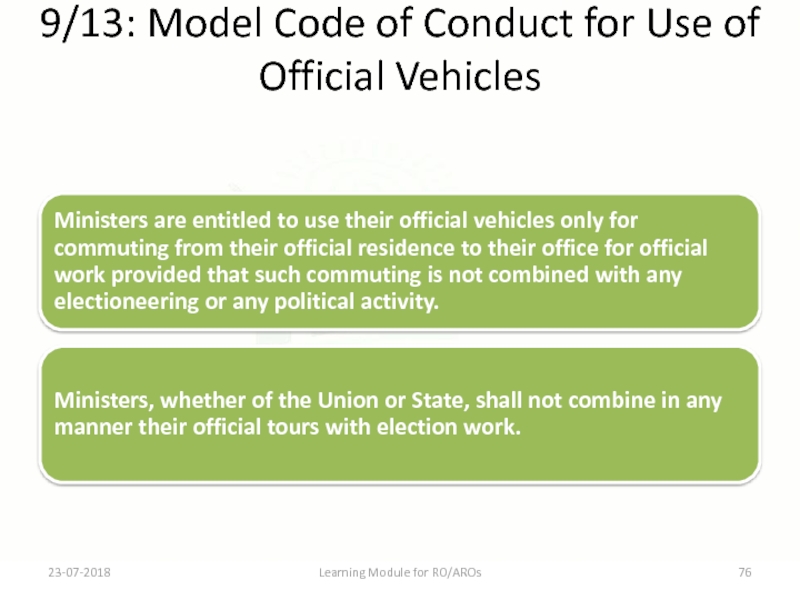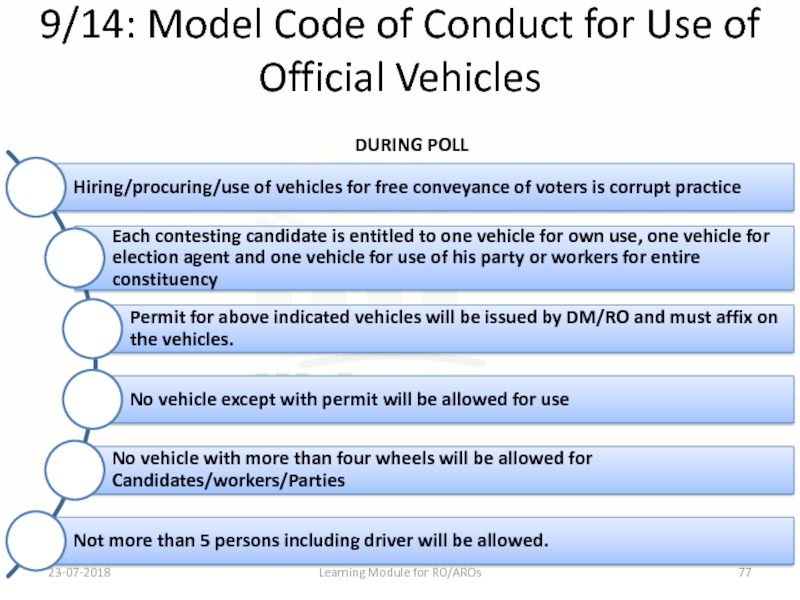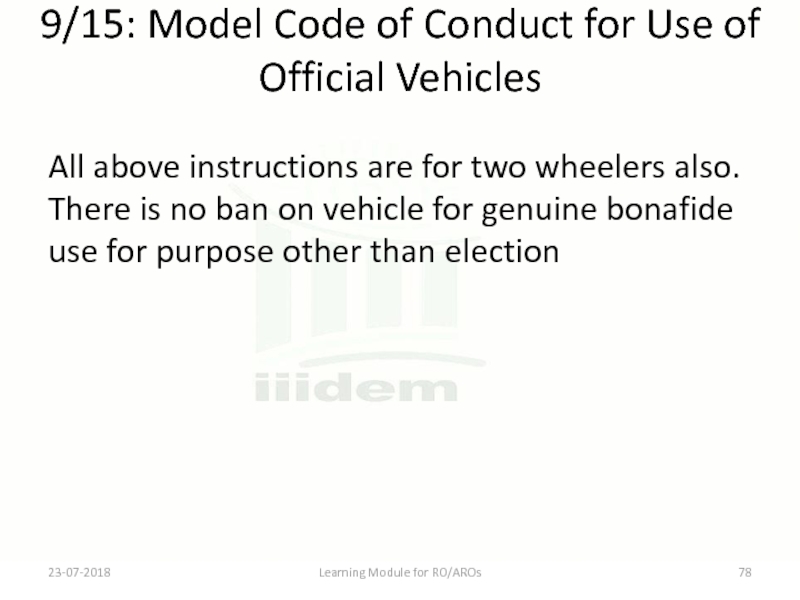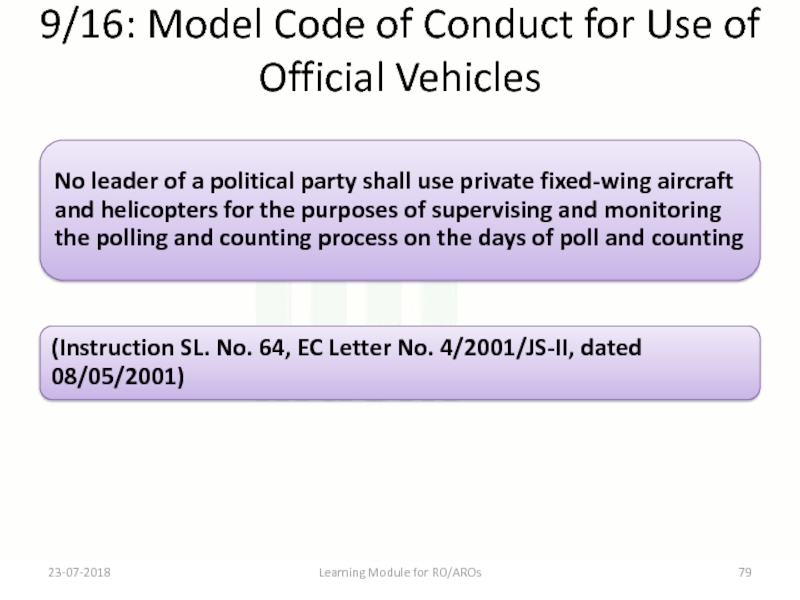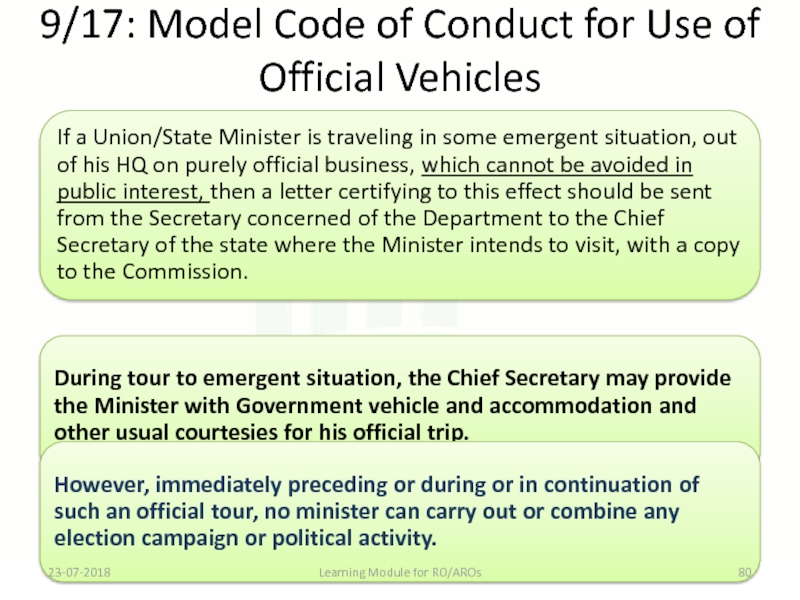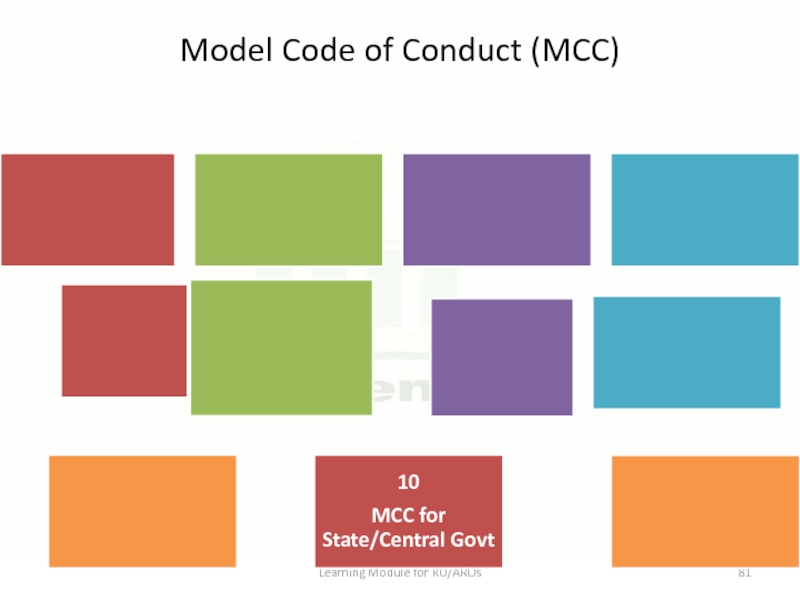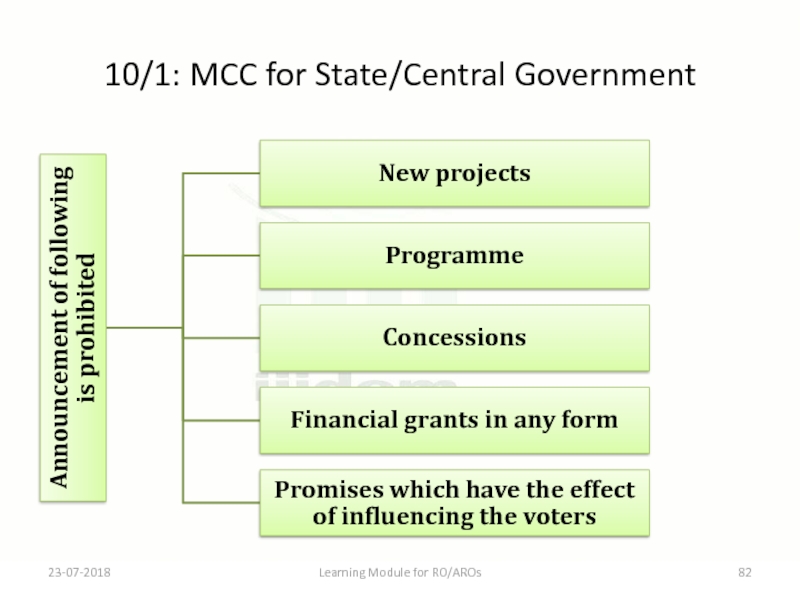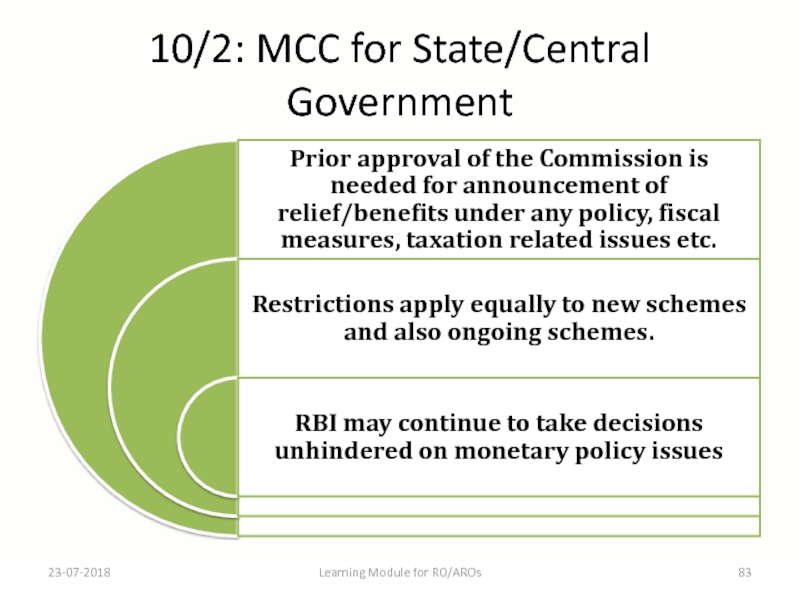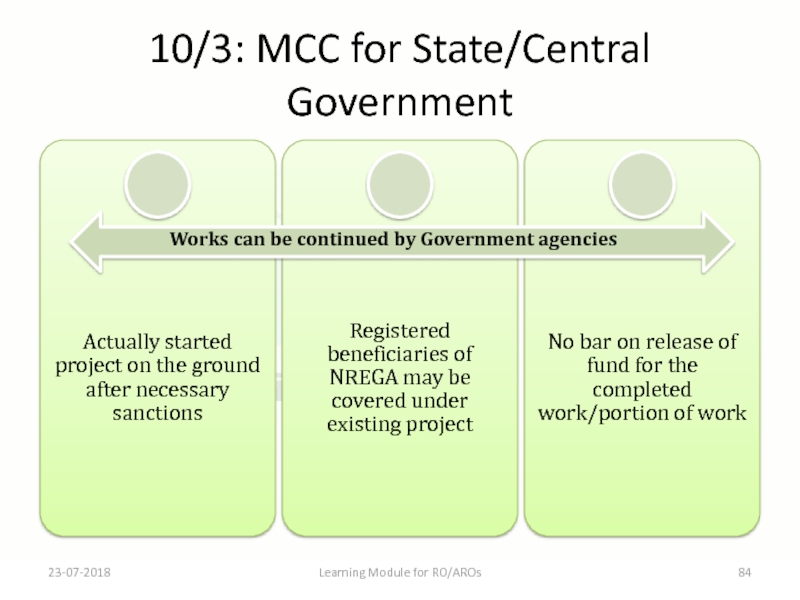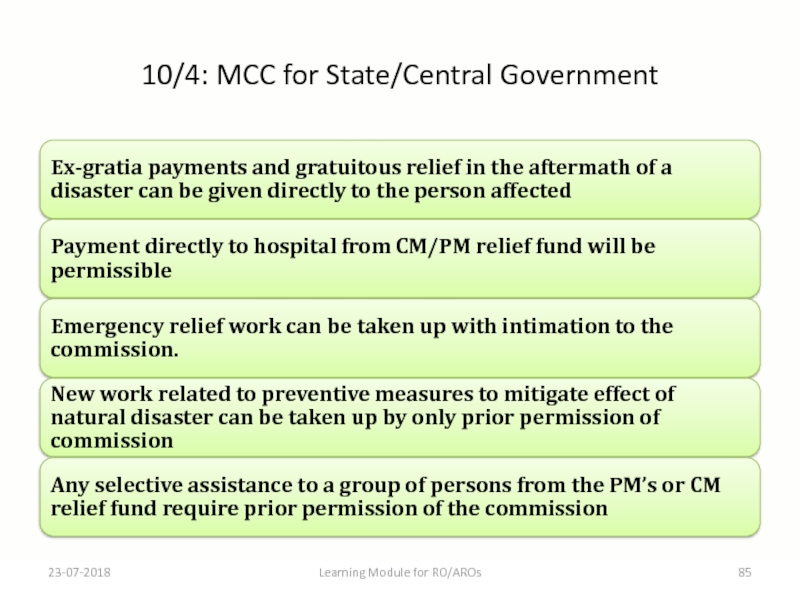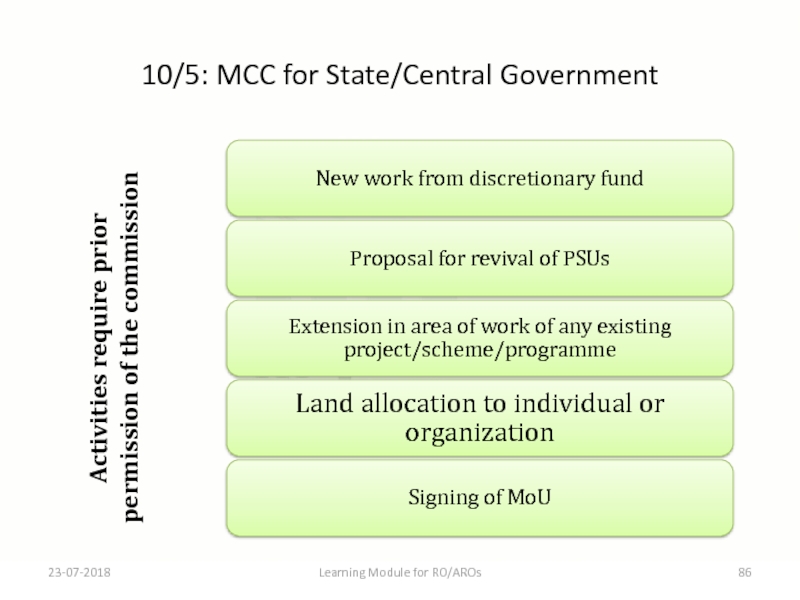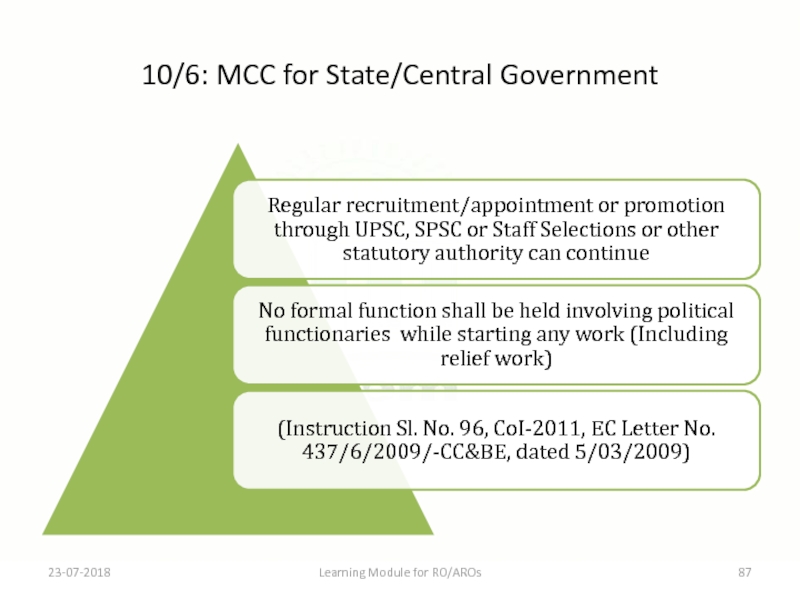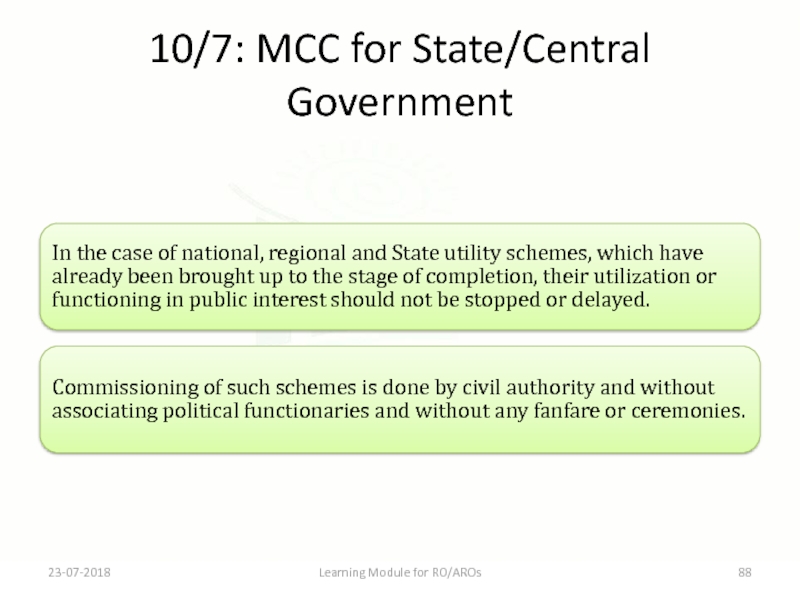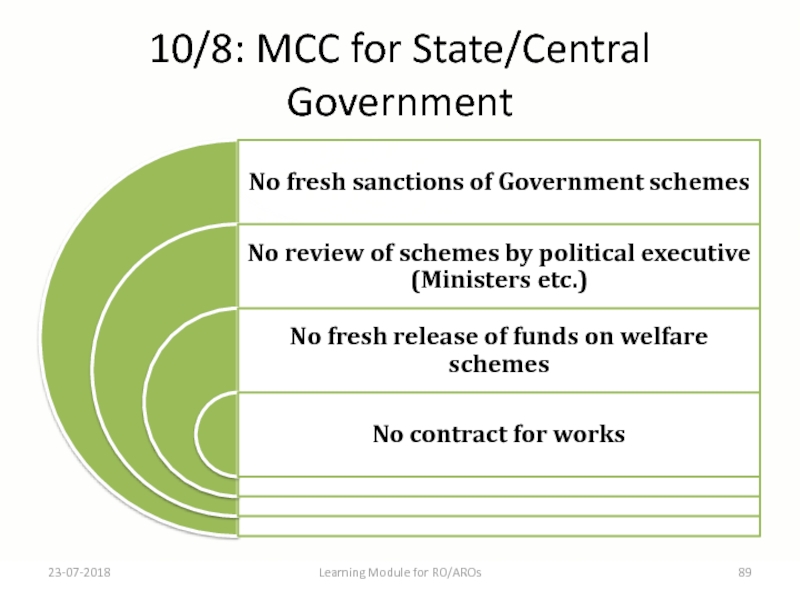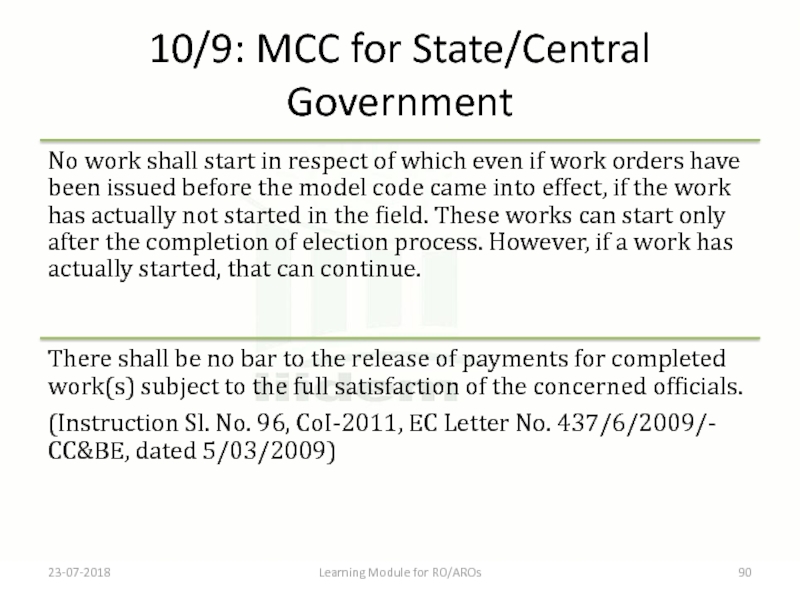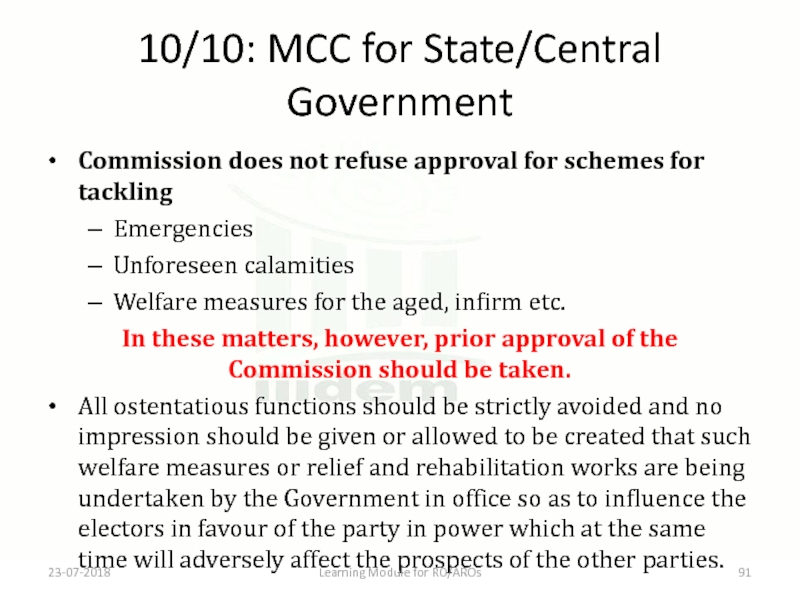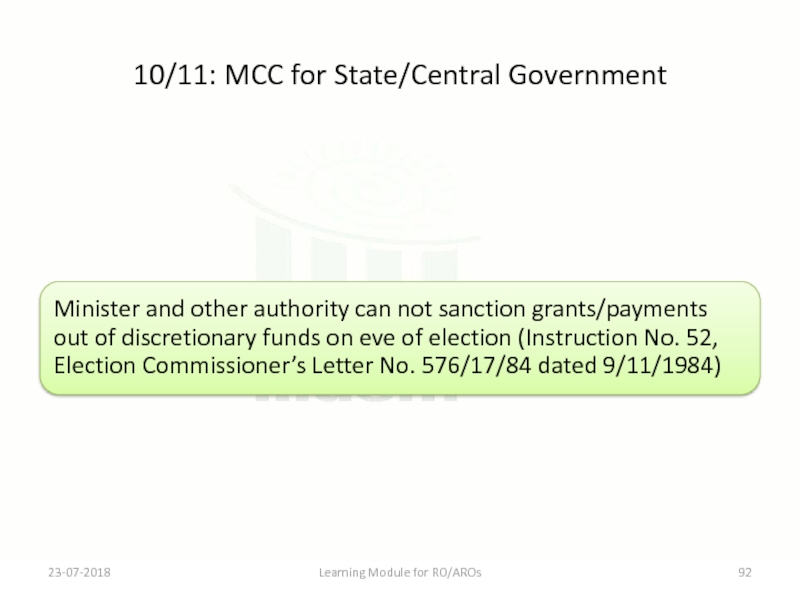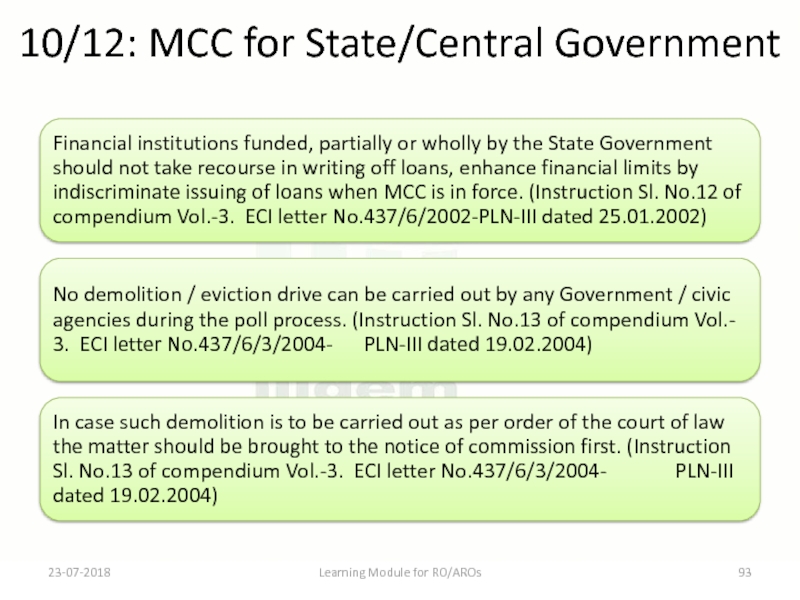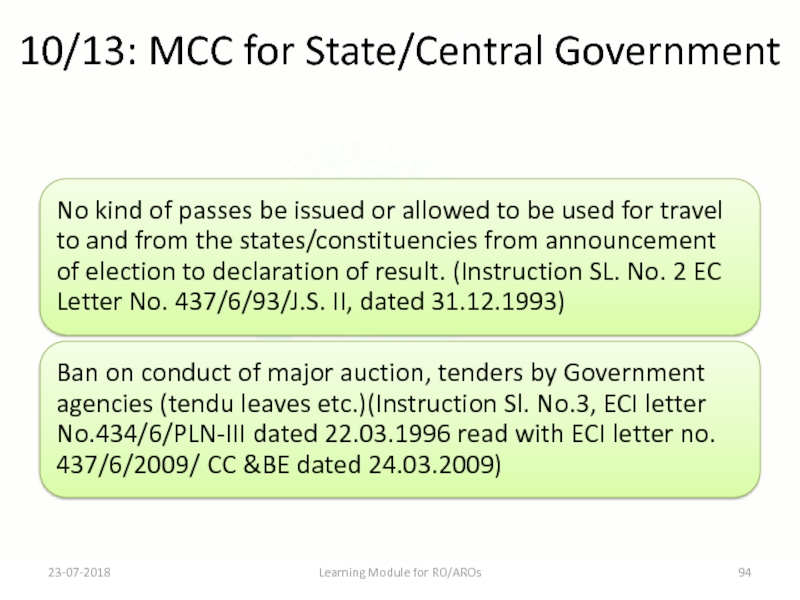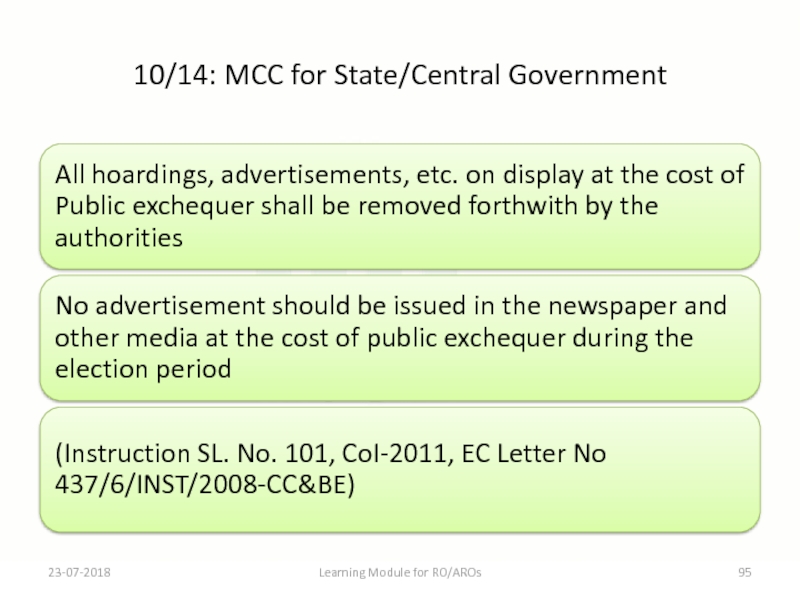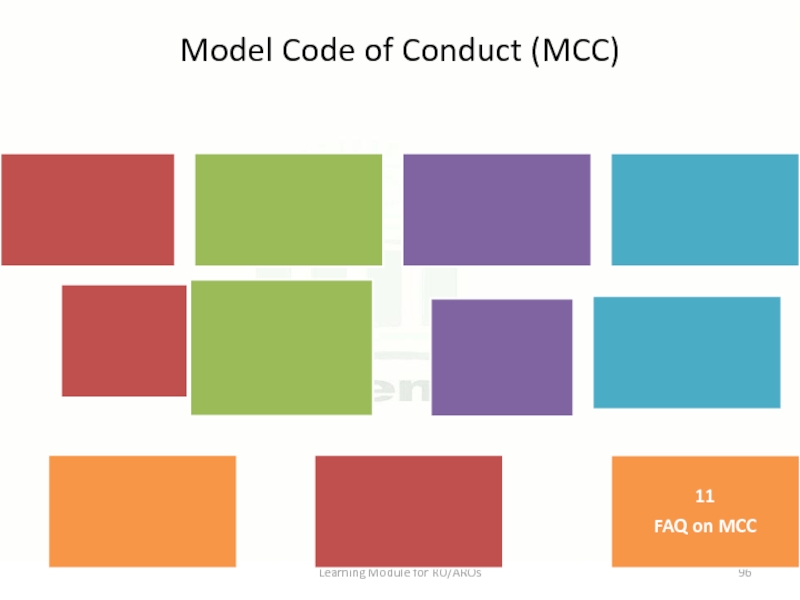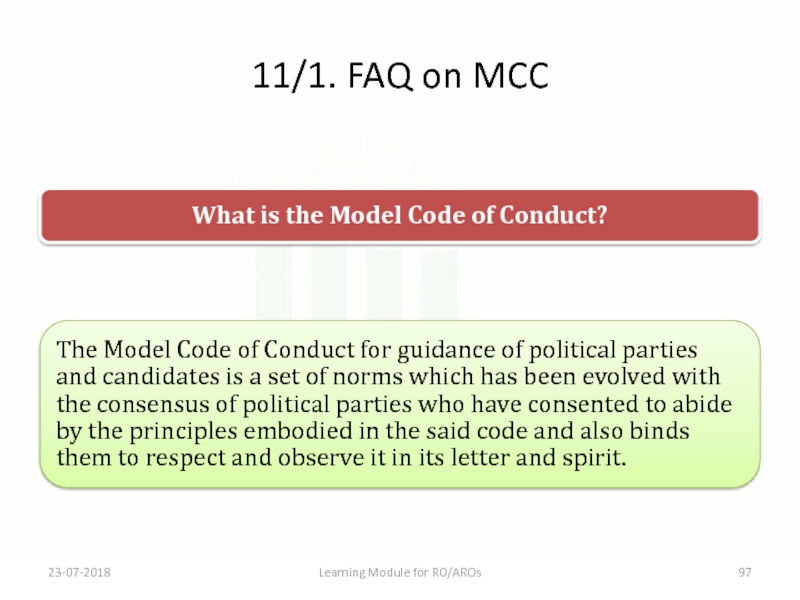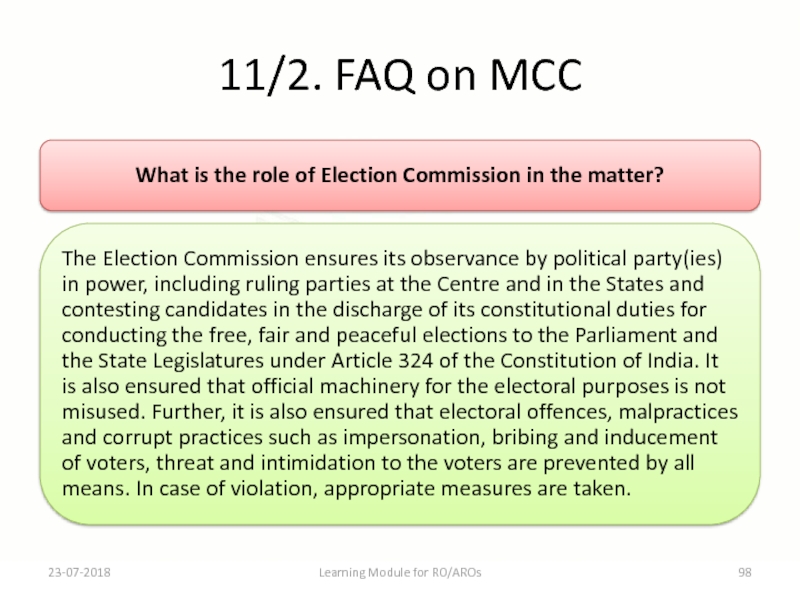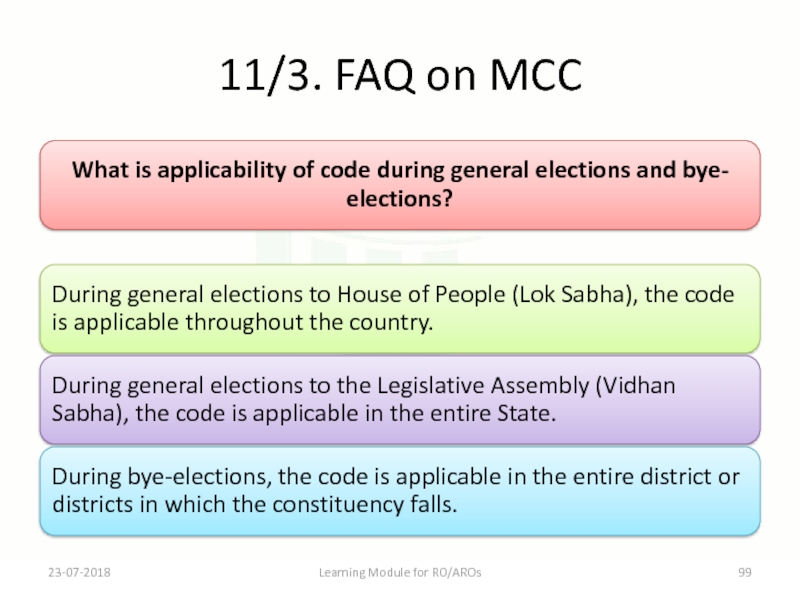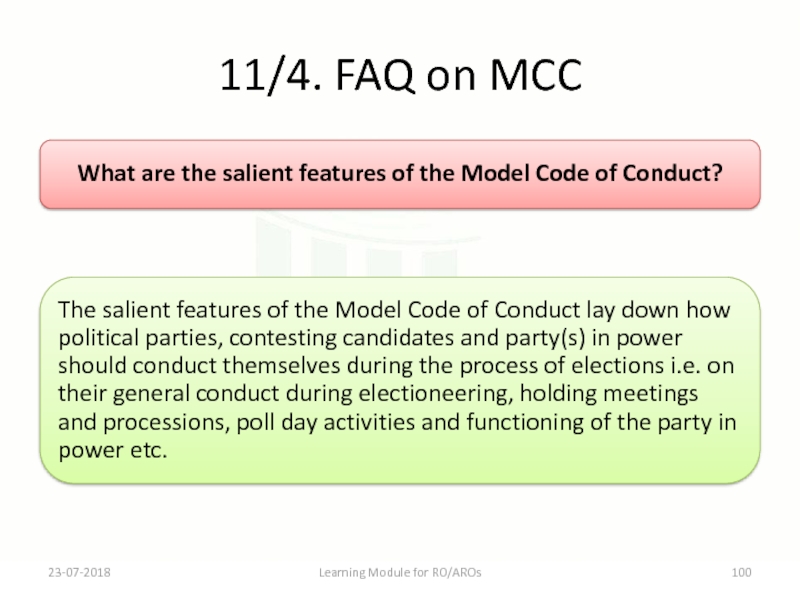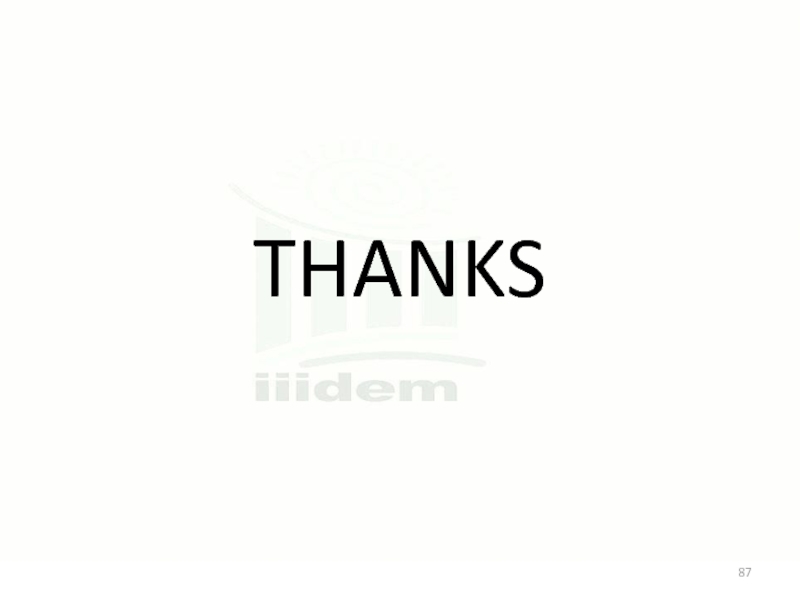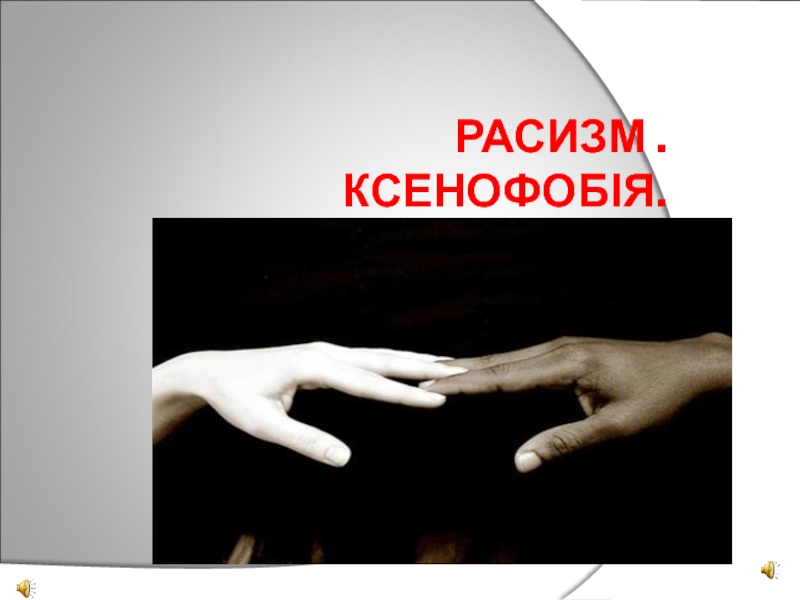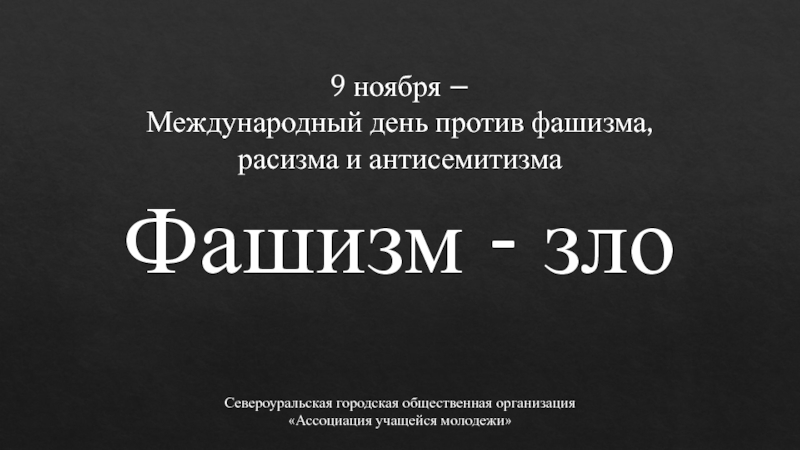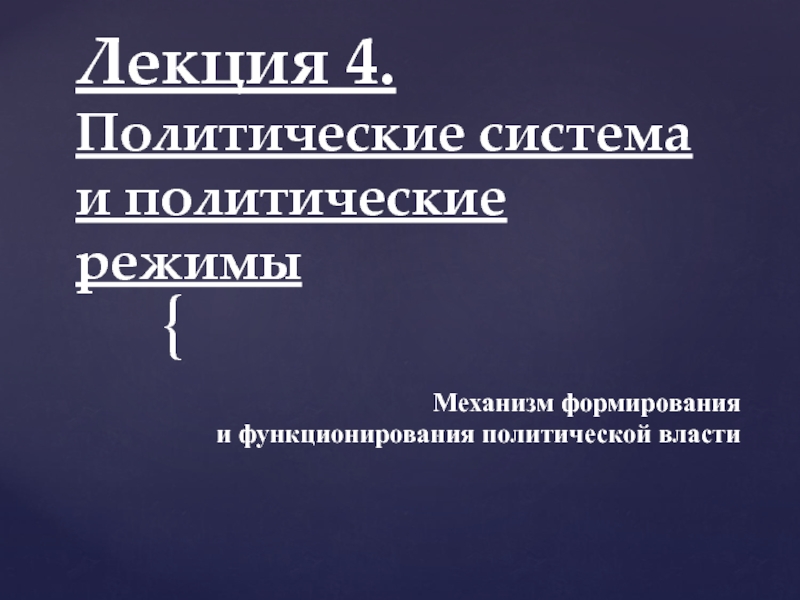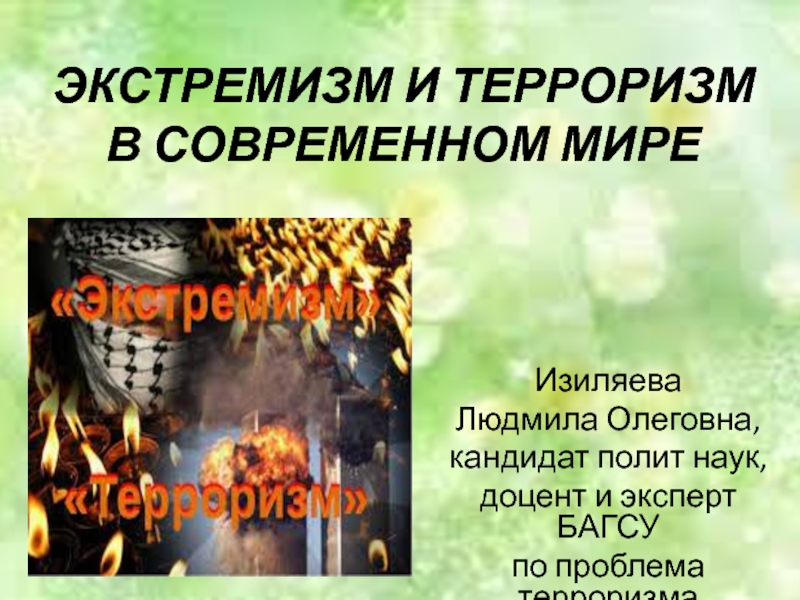- Главная
- Разное
- Дизайн
- Бизнес и предпринимательство
- Аналитика
- Образование
- Развлечения
- Красота и здоровье
- Финансы
- Государство
- Путешествия
- Спорт
- Недвижимость
- Армия
- Графика
- Культурология
- Еда и кулинария
- Лингвистика
- Английский язык
- Астрономия
- Алгебра
- Биология
- География
- Детские презентации
- Информатика
- История
- Литература
- Маркетинг
- Математика
- Медицина
- Менеджмент
- Музыка
- МХК
- Немецкий язык
- ОБЖ
- Обществознание
- Окружающий мир
- Педагогика
- Русский язык
- Технология
- Физика
- Философия
- Химия
- Шаблоны, картинки для презентаций
- Экология
- Экономика
- Юриспруденция
The Model Code of Conduct презентация
Содержание
- 1. The Model Code of Conduct
- 2. Model Code of Conduct (MCC) Learning Module for RO/AROs
- 3. The material on MCC has been
- 4. 1: Objective of MCC MCC comes into
- 5. 2: Rationale behind MCC A visible and
- 6. 3: Broad areas of Application Execution of
- 7. All subsequent slides are prepared in
- 8. Model Code of Conduct (MCC) Learning Module for RO/AROs
- 9. 4/1: Model Code of Conduct for Officials 17-05-2013 Learning Module for RO/AROs
- 10. 4/2: Model Code of Conduct for Officials
- 11. 4/3: Model Code of Conduct for Officials
- 12. Model Code of Conduct (MCC) Learning Module
- 13. 5/1: Model Code of Conduct for Ban
- 14. 5/2: Model Code of Conduct for Ban
- 15. 5/3: Model Code of Conduct for Ban
- 16. 5/4: Model Code of Conduct for Ban
- 17. 5/5: Model Code of Conduct for Ban
- 18. 5/6: Model Code of Conduct for Ban
- 19. Model Code of Conduct (MCC) Learning Module
- 20. 6/1: Model Code of Conduct for Ministers/Chairmen/Member
- 21. 6/2: Model Code of Conduct for Ministers/Chairmen/Member
- 22. 6/3: Model Code of Conduct for Ministers/Chairmen/Member
- 23. 6/4: Model Code of Conduct for Ministers/Chairmen/Member
- 24. 6/5: Model Code of Conduct for Ministers/Chairmen/Member
- 25. 6/6: Model Code of Conduct for Ministers/Chairmen/Member
- 26. 6/7: Model Code of Conduct for Ministers/Chairmen/Member of Commission
- 27. 6/8: Model Code of Conduct for Ministers/Chairmen/Member
- 28. 6/9: Model Code of Conduct for Ministers/Chairmen/Member
- 29. 6/10: Model Code of Conduct for Ministers/Chairmen/Member
- 30. 6/11: Model Code of Conduct for Ministers/Chairmen/Member
- 31. 6/12: Model Code of Conduct for Ministers/Chairmen/Member
- 32. 6/13: Model Code of Conduct for Ministers/Chairmen/Member
- 33. 6/14: Model Code of Conduct for Ministers/Chairmen/Member
- 34. 6/15: Model Code of Conduct for Ministers/Chairmen/Member
- 35. 6/16: Model Code of Conduct for Ministers/Chairmen/Member
- 36. Model Code of Conduct (MCC) Learning Module
- 37. 7/1: MCC for Political Parties and Candidates
- 38. 7/2: MCC for Political Parties and Candidates
- 39. 7/3: MCC for Political Parties and Candidates
- 40. 7/4: MCC for Political Parties and Candidates
- 41. 7/5 : MCC for Political Parties and
- 42. 7/6 : MCC for Political Parties and
- 43. 7/7 : MCC for Political Parties and
- 44. 7/8 : MCC for Political Parties and
- 45. 7/9 : MCC for Political Parties and
- 46. 7/10 : MCC for Political Parties and
- 47. Model Code of Conduct (MCC) Learning Module
- 48. Sub Learning Objective 10. Dos & Don’ts
- 49. 8/1. Do’s Ongoing programs, which actually started
- 50. 8/2. Do’s Public places like maidans must
- 51. 8/3. Do’s The right of every individual
- 52. 8/4. Do’s Permission must be obtained for
- 53. 8/5. Do’s The existence of any restrictive
- 54. 8/6. Do’s Unofficial identity slips issued to
- 55. 8/7. Do’s Any complaint or problem regarding
- 56. 8/8. Don’ts Any and all advertisements at
- 57. 8/9. Don’ts Race/caste/communal/religious/ language feelings of the
- 58. 8/10. Don’ts Activities which are corrupt practices
- 59. 8/11. Don’ts Subject to the local laws,
- 60. 8/12. Don’ts Processionists shall not carry any
- 61. 8/13. Don’ts Loudspeakers whether static or mounted
- 62. 8/14. Don’ts Distribution of liquor or bribery
- 63. Model Code of Conduct (MCC) Learning Module
- 64. 9/1: Model Code of Conduct for Use
- 65. 9/2: Model Code of Conduct for Use
- 66. 9/3: Model Code of Conduct for Use
- 67. 9/4: Model Code of Conduct for Use
- 68. 9/5: Model Code of Conduct for Use
- 69. 9/6: Model Code of Conduct for Use
- 70. 9/7: Model Code of Conduct for Use
- 71. 9/8: Model Code of Conduct for Use
- 72. 9/9: Model Code of Conduct for Use
- 73. 9/10: Model Code of Conduct for Use
- 74. 9/11: Model Code of Conduct for Use
- 75. 9/12: Model Code of Conduct for Use
- 76. 9/13: Model Code of Conduct for Use
- 77. 9/14: Model Code of Conduct for Use
- 78. 9/15: Model Code of Conduct for Use
- 79. 9/16: Model Code of Conduct for Use
- 80. 9/17: Model Code of Conduct for Use
- 81. Model Code of Conduct (MCC) Learning Module
- 82. 10/1: MCC for State/Central Government Announcement of
- 83. 10/2: MCC for State/Central Government Prior approval
- 84. 10/3: MCC for State/Central Government Actually started
- 85. 10/4: MCC for State/Central Government Ex-gratia payments
- 86. 10/5: MCC for State/Central Government New work
- 87. 10/6: MCC for State/Central Government Regular recruitment/appointment
- 88. 10/7: MCC for State/Central Government In the
- 89. 10/8: MCC for State/Central Government No fresh
- 90. 10/9: MCC for State/Central Government No work
- 91. 10/10: MCC for State/Central Government Commission does
- 92. 10/11: MCC for State/Central Government Minister and
- 93. 10/12: MCC for State/Central Government Financial institutions
- 94. 10/13: MCC for State/Central Government No kind
- 95. 10/14: MCC for State/Central Government All hoardings,
- 96. Model Code of Conduct (MCC) Learning Module
- 97. 11/1. FAQ on MCC What is the
- 98. 11/2. FAQ on MCC What is the
- 99. 11/3. FAQ on MCC What is applicability
- 100. 11/4. FAQ on MCC What are the
- 101. THANKS 87
Слайд 3
The material on MCC has been clubbed on the basis of
Слайд 41: Objective of MCC
MCC comes into operation from the day ECI
Developed for maintaining a healthy and peaceful atmosphere conducive to the conduct of smooth elections
Learning Module for RO/AROs
Слайд 52: Rationale behind MCC
A visible and rigorous enforcement of Model Code
It ensures that official machinery for the electoral purposes is not misused.
It ensures that electoral offences, malpractices and corrupt practices such as impersonation, bribing and inducement of voters, threat and intimidation to the voters, is prevented by all means.
Learning Module for RO/AROs
Слайд 63: Broad areas of Application
Execution of welfare schemes and Government work.
Publicity
Appointment, transfer and posting of Government officials.
Use of Rest House, Dak Bungalow and other Government accommodation.
Provisions regarding tour of Ministers / Political functionaries.
Use of official aircrafts/vehicles.
Use of loudspeaker.
Printing of pamphlet, posters & other media activities.
Learning Module for RO/AROs
Слайд 7
All subsequent slides are prepared in three different colors
Green
Blue
Purple
Green indicates pre-poll
Blue indicates poll-day task/instructions
Purple indicates post-poll task/instructions
17-05-2013
Learning Module for RO/AROs
Слайд 135/1: Model Code of Conduct for Ban on Transfer
There shall be
The Chief Electoral Officer and Additional/Joint/Deputy Chief Electoral Officers;
Divisional Commissioners;
17-05-2013
Learning Module for RO/AROs
Слайд 145/2: Model Code of Conduct for Ban on Transfer
The District Election
Officers of the Police Department connected with the management of elections like range IGs and DIGs, Senior Superintendents of Police and Superintendents of Police, Sub-divisional level Police Officers like Deputy Superintendents of Police and other Police officers who are deputed to the Commission under section 28A of the Representation of the People Act, 1951;
17-05-2013
Learning Module for RO/AROs
Слайд 155/3: Model Code of Conduct for Ban on Transfer
Other officers drafted
The transfer orders issued in respect of the above categories of officers prior to the date of announcement but not implemented till the time when model code came into effect should not be given effect to without obtaining specific permission from the Commission.
17-05-2013
Learning Module for RO/AROs
Слайд 165/4: Model Code of Conduct for Ban on Transfer
In those cases
No appointments or promotions in Government / Public Undertakings shall be made during this period, without prior clearance of the Commission.
17-05-2013
Learning Module for RO/AROs
Слайд 175/5: Model Code of Conduct for Ban on Transfer
Various instructions on
Officer should not be allowed to continue in the present district if officer is posted in her/his home district and completed three years out of four years in that district.
Officers/officials against whom Commission has recommended disciplinary action or who have been charged for any lapse in any election or election related work or who were transferred under the orders of the Commission previously may not be assigned any election related duty(ies).
The Commission further desires that no officer/official against whom a criminal case is pending in any court of law, be associated with the election work or election related duty.
17-05-2013
Learning Module for RO/AROs
Слайд 185/6: Model Code of Conduct for Ban on Transfer
Various instructions on
The transfer orders in respect of officers/officials who are engaged in the electoral rolls revision work shall be implemented only after final publication of electoral rolls.
The copies of the transfer orders issued under these directions shall be given to the Chief Electoral Officers concerned without fail.
Any officer who is due to retire within coming six months will be exempted from the purview of the above-mentioned directions of the Commission.
All the officials of the States/UTs who are on extension of service or re-employed in different capacities will not be associated with any election related work except those with the Office of CEOs.
Instruction SL. No. 81, Election Commission’s letter No. 437/6/2006/PLN- III Dated : 06th November, 2006
17-05-2013
Learning Module for RO/AROs
Слайд 19Model Code of Conduct (MCC)
Learning Module for RO/AROs
6
MCC for Ministers/Chairmen/Members of
Слайд 206/1: Model Code of Conduct for Ministers/Chairmen/Member of Commission
No minister either
No minister will summon any election related officer of constituency or state in which any elections have been announced, to a place or office, or guest house outside the aforesaid constituency for any official discussion during the period of elections commencing with the announcement of the elections from such constituency and ending with the completion of election process.
( Instruction Sl. No. 56, EC Letter No. 437/6/96/PLN-III dated 17/01/1996)
17-05-2013
Learning Module for RO/AROs
Слайд 216/2: Model Code of Conduct for Ministers/Chairmen/Member of Commission
Exception: In case
(Instruction Sl. No. 75, CoI-2011, EC Letter- 437/6/2007-PLN-III, Dated 23/11/2007)
17-05-2013
Learning Module for RO/AROs
Слайд 226/3: Model Code of Conduct for Ministers/Chairmen/Member of Commission
All arrangements to
Journey undertaken by minister for filling nomination papers and subsequent tours to his constituency should be regarded as being for election process.
(Annexure-1, Copy of circular letter No. 10/17/89-M&G, dated November 1, 1989)
17-05-2013
Learning Module for RO/AROs
Слайд 236/4: Model Code of Conduct for Ministers/Chairmen/Member of Commission
Under no circumstances,
Minister travelling for official work should not halt in the constituency or district where model code of conduct is in force and shall not attend to any political work
(Instruction SL. No. 57, EC Letter No. 437/6/7/2004/PLN-III, Dated 28/12/2004)
(Instruction SL. No. 75, CoI-2011, EC Letter No. 437/6/7/2004/PLN-III, Dated 23/11/2007)
17-05-2013
Learning Module for RO/AROs
Слайд 246/5: Model Code of Conduct for Ministers/Chairmen/Member of Commission
No central Minister
Central Minister / State Minister can participate in celebration of “Sadbhavna Divas” but their speeches should be confined only to promotion of harmony. (Instruction Sl. No.7, ECI letter No.437/6/99-PLN-III, dated 16.08.1999)
17-05-2013
Learning Module for RO/AROs
Слайд 256/6: Model Code of Conduct for Ministers/Chairmen/Member of Commission
No Pilot car(s),
(Instruction Sl. No. 75, CoI-2011, EC Letter- 437/6/2007-PLN-III, Dated 23/11/2007)
17-05-2013
Learning Module for RO/AROs
Слайд 276/8: Model Code of Conduct for Ministers/Chairmen/Member of Commission
It is open
For such private visits, the official personal staff of the ministers shall not accompany them.
If a Union/State Minister is traveling in some emergent situation, out of his HQ on purely official business, which cannot be avoided in public interest, then a letter certifying to this effect should be sent from the Secretary concerned of the Department to the Chief Secretary of the state where the Minister intends to visit, with a copy to the Commission.
17-05-2013
Learning Module for RO/AROs
Слайд 286/9: Model Code of Conduct for Ministers/Chairmen/Member of Commission
During tour to
However, immediately preceding or during or in continuation of such an official tour, no minister can carry out or combine any election campaign or political activity.
17-05-2013
Learning Module for RO/AROs
Слайд 296/10: Model Code of Conduct for Ministers/Chairmen/Member of Commission
No Minister, whether
Only exception will be when a Minister, in his capacity as in charge of the department concerned, or a Chief Minister undertakes an official visit to a constituency, in connection with failure of law and order or a natural calamity or any such emergency.
17-05-2013
Learning Module for RO/AROs
Слайд 306/11: Model Code of Conduct for Ministers/Chairmen/Member of Commission
Ministers are entitled
Ministers, whether of the Union or State, shall not combine in any manner their official tours with election work.
17-05-2013
Learning Module for RO/AROs
Слайд 316/12: Model Code of Conduct for Ministers/Chairmen/Member of Commission
Any entertainment at
There is no ban to organize kavi sammelan, mushairas or other cultural functions in connection with Republic Day celebrations and being attended by the Central Ministers, Chief Ministers, Ministers in the States and other political functionaries. However, utmost care should be taken to ensure that no political speeches are made on the occasion (Instruction Sl. No. 5, ECI letter No.437 / 6/ 98-PLN-III dated 10.01.1998 )
17-05-2013
Learning Module for RO/AROs
Слайд 326/13: Model Code of Conduct for Ministers/Chairmen/Member of Commission
Any official who
17-05-2013
Learning Module for RO/AROs
Слайд 336/14: Model Code of Conduct for Ministers/Chairmen/Member of Commission
All ministers both
(Instruction Sl. No. 63, Election Commission’s letter No.437/6/GUJ/98-PLN-III dated 16.01.1998 )
17-05-2013
Learning Module for RO/AROs
Слайд 346/15: Model Code of Conduct for Ministers/Chairmen/Member of Commission
No Official Video
Minister and other authority can not sanction grants/payments out of discretionary funds on eve of election (Instruction No. 52, Election Commissioner’s Letter No. 576/17/84 dated 9/11/1984)
17-05-2013
Learning Module for RO/AROs
Слайд 356/16: Model Code of Conduct for Ministers/Chairmen/Member of Commission
Official visit of
During such visit chairmen/members should not meet ministers/politicians and should not hold public hearing or meet people
17-05-2013
Learning Module for RO/AROs
Слайд 36Model Code of Conduct (MCC)
Learning Module for RO/AROs
7
MCC for Political parties
Слайд 377/1: MCC for Political Parties and Candidates
No party or candidate shall
Criticism of other political parties, when made, shall be confined to their policies and programme, past record and work. Parties and Candidates shall refrain from criticism of all aspects of private life, not connected with the public activities of the leaders or workers of other parties. Criticism of other parties or their workers based on unverified allegations or distortion shall be avoided.
There shall be no appeal to caste or communal feelings for securing votes. Mosques, Churches, Temples or other places of worship shall not be used as forum for election propaganda.
17-05-2013
Learning Module for RO/AROs
Слайд 387/2: MCC for Political Parties and Candidates
All parties and candidates shall
The right of every individual for peaceful and undisturbed home-life shall be respected, however much the political parties or candidates may resent his political opinions or activities. Organising demonstrations or picketing before the houses of individuals by way of protesting against their opinions or activities shall not be resorted to under any circumstances.
17-05-2013
Learning Module for RO/AROs
Слайд 397/3: MCC for Political Parties and Candidates
No political party or candidate
Political parties and candidates shall ensure that their supporters do not create obstructions in or break up meetings and processions organised by other parties. Workers or sympathisers of one political party shall not create disturbances at public meetings organised by another political party by putting questions orally or in writing or by distributing leaflets of their own party. Processions shall not be taken out by one party along places at which meetings are held by another party. Posters issued by on e party shall not be removed by workers of another party
17-05-2013
Learning Module for RO/AROs
Слайд 407/4: MCC for Political Parties and Candidates
The expenditure incurred on security
(Instruction SL. No. 55, EC letter No 437/6/ES0025/94/MCS dated 21/10/1994)
17-05-2013
Learning Module for RO/AROs
Слайд 417/5 : MCC for Political Parties and Candidates
All advertisement for telecasting
The CEO of the states/UTs also required to constitute committee to attend complaints on certification of advertisement
(Instruction SL. No. 77, CoI-2011, EC Letter No. 509/75/2004/JS-I, Dated 15/04/2004)
17-05-2013
Learning Module for RO/AROs
Слайд 427/6 : MCC for Political Parties and Candidates
The campaign by star
The CEO and DEO should maintain party wise register to track instances of violations being committed by campaigners of political parties
Record also put in public domain so that interested parties can pick up the input
(Instruction SL. No. 88, CoI-2011, EC Letter 437/6/inst/2008-CC&BE)
All political parties should try to avoid the use of plastic/polythene for preparation of posters, banners etc. during election campaign.
(Instruction SL. No. 44, EC Letter No. 4/3/2004/J.S.lI/Vol.l, dated 11.03.2004)
17-05-2013
Learning Module for Sector Officer
Слайд 437/7 : MCC for Political Parties and Candidates
No part of State
17-05-2013
Learning Module for RO/AROs
Слайд 447/8 : MCC for Political Parties and Candidates
Even casual meeting by
Only the vehicle carrying the person allotted accommodation in the guest house and not more than two other vehicles, if used by the person, will be permitted inside the compound of the Guest House (Relevant to police officers also)
Rooms should not be made available for more than 48 hours to any single individual.
However, 48 hours before the close of poll in any particular area, there will be freeze on such allocations till completion of poll or re-poll.
Instruction SL. No. 72 of CoI-2011, Election Commission’s letter No 437 /6 /38 /2004-PLN-III, dated 06.04.2004
17-05-2013
Learning Module for RO/AROs
Слайд 457/9 : MCC for Political Parties and Candidates
Accommodation can be given
No political activities will be allowed during stay in government guest house
(Instruction SL.No. 73, of CoI-2011, EC Letter No. 437/6/2006-PLN (Vol.II)
17-05-2013
Learning Module for RO/AROs
Слайд 467/10 : MCC for Political Parties and Candidates
Government accommodation shall not
No party or candidate shall use or be allowed to use government accommodation as a campaign office or for holding any public meeting for the purposes of election propaganda.
It shall be ensured that no functionary can use the Circuit House, Dak bungalow to set up campaign office.
17-05-2013
Learning Module for RO/AROs
Слайд 47Model Code of Conduct (MCC)
Learning Module for RO/AROs
8
MCC for Dos &
Слайд 48Sub Learning Objective 10. Dos & Don’ts
The commission has drawn up
The list of dos’ and don’ts’ is only illustrative and not exhaustive and is not intended to substitute or modify other detailed directions/instructions on the above subjects, which must be strictly observed and followed.
17-05-2013
Learning Module for RO/AROs
Слайд 498/1. Do’s
Ongoing programs, which actually started in the field before the
Relief and rehabilitation measures to the people in areas affected by floods, drought, pestilence, and other natural calamities, can commence and continue.
Grant of cash or medical facilities to terminally or critically ill persons can continue with appropriate approvals.
17-05-2013
Learning Module for RO/AROs
Слайд 508/2. Do’s
Public places like maidans must be available impartially to all
Criticism of other political parties and candidates should relate to their policies, programme, past record and work.
17-05-2013
Learning Module for RO/AROs
Слайд 518/3. Do’s
The right of every individual for peaceful and undisturbed home
The local police authorities should be fully informed of the venue and time of the proposed meetings well in time and all necessary permissions taken.
If there are any restrictive or prohibitory orders in force in the place of the proposed meeting, they shall be fully respected. Exemption, if necessary, must be applied for and obtained well in time.
17-05-2013
Learning Module for RO/AROs
Слайд 528/4. Do’s
Permission must be obtained for the use of loudspeakers or
The assistance of the police should be obtained in dealing with persons disturbing meetings or otherwise creating disorder.
The time and place of the starting of any procession, the route to be followed and the time and place at which the procession will terminate should be settled in advance and advance permissions obtained from the police/competent authorities.
17-05-2013
Learning Module for RO/AROs
Слайд 538/5. Do’s
The existence of any restrictive orders in force in the
The passage of the procession must be without hindrance to traffic.
Co-operation should be extended to all election officials at all times to ensure peaceful and orderly poll.
All Workers must display badges or identity cards.
17-05-2013
Learning Module for RO/AROs
Слайд 548/6. Do’s
Unofficial identity slips issued to voters shall be on plain
Restrictions on plying of vehicles during the campaign period and on poll day shall be fully obeyed by the candidates/ political parties etc.
Except voters, candidates and their election/polling agents, only persons with a specific valid authority letter from the Election Commission can enter any polling booth. No functionary however highly placed (e.g. Chief Minister, Minister, MP or MLA etc) is exempt from this condition.
17-05-2013
Learning Module for RO/AROs
Слайд 558/7. Do’s
Any complaint or problem regarding the conduct of elections shall
Directions/orders/instructions of the Election Commission, the Returning Officer, and the District Election Officer shall be obeyed in all matters related to various aspects of election.
Do leave the constituency after the campaign period is over if you are not a voter or a candidate or candidate’s election agent from that constituency.
17-05-2013
Learning Module for RO/AROs
Слайд 568/8. Don’ts
Any and all advertisements at the cost of the public
No Minister shall enter any polling station or the place of counting, unless he or she is a candidate or as a voter only for voting.
Official work should not at all be mixed with campaigning/electioneering.
No inducement, financial or otherwise, shall be offered to the voter.
17-05-2013
Learning Module for RO/AROs
Слайд 578/9. Don’ts
Race/caste/communal/religious/ language feelings of the electors shall not be appealed
No activity, which may aggravate existing differences or create mutual hatred or cause tension between different castes, communities or religious or linguistic groups shall be attempted.
No aspect of the private life, not connected with the public activities, of the leaders or workers of other parties shall be permitted to be criticized.
17-05-2013
Learning Module for RO/AROs
Слайд 588/10. Don’ts
Activities which are corrupt practices or electoral offences as per
Demonstrations or picketing before the houses of individuals by way of protesting against their opinion or activities shall not be resorted to.
Other parties or their workers shall not be criticized based on unverified allegations or on distortions.
Temples, Mosques, Churches, Gurudwaras or any place of worship shall not be used as places for election propaganda, including speeches, posters, music etc., on electioneering.
17-05-2013
Learning Module for RO/AROs
Слайд 598/11. Don’ts
Subject to the local laws, no one can make use
No disturbances shall be created in public meetings or processions organized by other political parties or candidates. (Section 127, RP Act 1951)
Processions along places at which another party is holding meetings shall not be undertaken.
17-05-2013
Learning Module for RO/AROs
Слайд 608/12. Don’ts
Processionists shall not carry any articles, which are capable of
Posters issued by other parties and candidates shall not be removed or defaced.
Posters, flags, symbols or any other propaganda material shall not be displayed in the place being used on the day of poll for distribution of identity slips or within 200 meter radius of polling stations.
17-05-2013
Learning Module for RO/AROs
Слайд 618/13. Don’ts
Loudspeakers whether static or mounted on moving vehicles shall not
No person who has been assessed to be having a security threat and therefore provided official security or who has private security guards for himself, shall be appointed as an election agent or polling agent or counting agent.
17-05-2013
Learning Module for RO/AROs
Слайд 628/14. Don’ts
Distribution of liquor or bribery in any form is prohibited
On the day of the poll, no person who has been assessed to be having a security threat and therefore given official security shall enter the vicinity of a polling station premise (within 100 meters) with his security personnel.
If the person provided with official security happens to be a voter also, then he or she shall restrict his / her movement - accompanied by security personnel, to voting only.
17-05-2013
Learning Module for RO/AROs
Слайд 649/1: Model Code of Conduct for Use of Official Vehicles
Official vehicles
17-05-2013
Learning Module for RO/AROs
Слайд 659/2: Model Code of Conduct for Use of Official Vehicles
In respect
The use of multiple cars in the name of stand-by should not be permitted unless so specifically prescribed by security authorities.
The cost of propulsion of such bullet proof vehicles where such use of bullet proof vehicles is specified will be borne by the particular person or his party whether he is in office or out, and whether he is a candidate or not
17-05-2013
Learning Module for RO/AROs
Слайд 669/3: Model Code of Conduct for Use of Official Vehicles
Under the
(Instruction Sl. No. 92, CoI-2011EC Letter No. 437/6/2007/PLN.III, Dated 24th October 2007)
17-05-2013
Learning Module for RO/AROs
Слайд 679/4: Model Code of Conduct for Use of Official Vehicles
The number
In all cases where a party or a candidate hires a private aircraft/helicopter for any reason whatsoever, the complete cost will be included as part of election expenditure without exception.
No relaxation can be provided on any considerations including those of security to any one regarding the use of loudspeakers whether fitted on vehicles or otherwise.
(EC letter No, 437/6/INST/2010-CC&BE, Dated 05/10/2010)
17-05-2013
Learning Module for RO/AROs
Слайд 689/5: Model Code of Conduct for Use of Official Vehicles
Full records
(Instruction SL. No. 62, EC Letter, No. 437/6/98-PLN-III, Dated 18/08/1999)
Restriction on the use of official vehicles for campaigning, electioneering or election related travel will be equally applicable in the case of Speaker and Deputy Speaker of the State Legislative Assembly at the time of General Election
(Instruction SL. No. 63, EC Letter No. 4/2001/J.S.II dated 30/03/2001)
17-05-2013
Learning Module for RO/AROs
Слайд 699/6: Model Code of Conduct for Use of Official Vehicles
Whether on
Pilot car(s)
Car(s) with beacon lights of any color
Car(s) affixed with sirens of any kind
The restriction will apply even if the State administration has granted him a security cover. Also whether the vehicle is government owned or private .
17-05-2013
Learning Module for RO/AROs
Слайд 709/7: Model Code of Conduct for Use of Official Vehicles
Only three
17-05-2013
Learning Module for RO/AROs
During Filling Nomination
Слайд 719/8: Model Code of Conduct for Use of Official Vehicles
Local administration
CEO will issue permits for video vans for electioneering by political parties.
A cycle rickshaw is also a vehicle, it expenditure should be accounted in the account of candidate if its is used for campaigning
(Instruction SL. No. 76, CoI-2011, EC Letter No. 437/6/2006-PLN-III, Dated 23/11/2007)
The vehicles in convoy shall not be more than ten excluding security vehicles
(Instruction SL. No. 110, CoI-2011, EC Letter No. 437/6/INST/2010-CC&BE, Dated 5/10/2010)
17-05-2013
Learning Module for RO/AROs
During Electioneering
Слайд 729/9: Model Code of Conduct for Use of Official Vehicles
From the
If any person moves in a convoy of vehicles exceeding the limits prescribed above, in spite of the convoy having been broken, it shall be the duty of the local administration to ensure that such vehicles are not allowed to be used till elections are over.
17-05-2013
Learning Module for RO/AROs
Слайд 739/10: Model Code of Conduct for Use of Official Vehicles
The contesting
Any further deployment of any additional vehicles can take place only after notice to this effect is given by the candidates or his agent well before the actual deployment of the vehicles.
While conveying the details of the vehicles that are being deployed for election campaign the details of the areas [tehsil(s)] in which the vehicle would operate, should also be conveyed
17-05-2013
Learning Module for RO/AROs
Слайд 749/11: Model Code of Conduct for Use of Official Vehicles
The details
The vehicles employed for election campaign as per intimation given by the candidates or their election agents to the District Administration should not be requisitioned by the administration.
Any vehicle that has not been registered for campaigning with the district administration if found being used for campaigning, shall be deemed to be unauthorized campaigning for the candidate and may attract penal provisions of Chapter IX A of the Indian Penal Code and shall therefore be immediately taken out of the campaigning exercise
(Instruction Sl. No. 59 EC letter No.437/6/97-PLN-III Dated 18.03.1997)
17-05-2013
Learning Module for RO/AROs
Слайд 759/12: Model Code of Conduct for Use of Official Vehicles
No leader
(Instruction SL. No. 64, EC Letter No. 4/2001/JS-II, dated 08/05/2001)
17-05-2013
Learning Module for RO/AROs
Слайд 769/13: Model Code of Conduct for Use of Official Vehicles
Ministers are
Ministers, whether of the Union or State, shall not combine in any manner their official tours with election work.
17-05-2013
Learning Module for RO/AROs
Слайд 779/14: Model Code of Conduct for Use of Official Vehicles
Hiring/procuring/use of
Each contesting candidate is entitled to one vehicle for own use, one vehicle for election agent and one vehicle for use of his party or workers for entire constituency
Permit for above indicated vehicles will be issued by DM/RO and must affix on the vehicles.
No vehicle except with permit will be allowed for use
No vehicle with more than four wheels will be allowed for Candidates/workers/Parties
Not more than 5 persons including driver will be allowed.
17-05-2013
Learning Module for RO/AROs
DURING POLL
Слайд 789/15: Model Code of Conduct for Use of Official Vehicles
All above
17-05-2013
Learning Module for RO/AROs
Слайд 799/16: Model Code of Conduct for Use of Official Vehicles
No leader
(Instruction SL. No. 64, EC Letter No. 4/2001/JS-II, dated 08/05/2001)
17-05-2013
Learning Module for RO/AROs
Слайд 809/17: Model Code of Conduct for Use of Official Vehicles
If a
During tour to emergent situation, the Chief Secretary may provide the Minister with Government vehicle and accommodation and other usual courtesies for his official trip.
However, immediately preceding or during or in continuation of such an official tour, no minister can carry out or combine any election campaign or political activity.
17-05-2013
Learning Module for RO/AROs
Слайд 8210/1: MCC for State/Central Government
Announcement of following is prohibited
New projects
Programme
Concessions
Financial grants in any form
Promises which have the effect of influencing the voters
17-05-2013
Learning Module for RO/AROs
Слайд 8310/2: MCC for State/Central Government
Prior approval of the Commission is needed
Restrictions apply equally to new schemes and also ongoing schemes.
RBI may continue to take decisions unhindered on monetary policy issues
17-05-2013
Learning Module for RO/AROs
Слайд 8410/3: MCC for State/Central Government
Actually started project on the ground after
Registered beneficiaries of NREGA may be covered under existing project
No bar on release of fund for the completed work/portion of work
17-05-2013
Learning Module for RO/AROs
Works can be continued by Government agencies
Слайд 8510/4: MCC for State/Central Government
Ex-gratia payments and gratuitous relief in the
Payment directly to hospital from CM/PM relief fund will be permissible
Emergency relief work can be taken up with intimation to the commission.
New work related to preventive measures to mitigate effect of natural disaster can be taken up by only prior permission of commission
Any selective assistance to a group of persons from the PM’s or CM relief fund require prior permission of the commission
17-05-2013
Learning Module for RO/AROs
Слайд 8610/5: MCC for State/Central Government
New work from discretionary fund
Proposal for revival
Extension in area of work of any existing project/scheme/programme
Land allocation to individual or organization
Signing of MoU
17-05-2013
Learning Module for RO/AROs
Activities require prior permission of the commission
Слайд 8710/6: MCC for State/Central Government
Regular recruitment/appointment or promotion through UPSC, SPSC
No formal function shall be held involving political functionaries while starting any work (Including relief work)
(Instruction Sl. No. 96, CoI-2011, EC Letter No. 437/6/2009/-CC&BE, dated 5/03/2009)
17-05-2013
Learning Module for RO/AROs
Слайд 8810/7: MCC for State/Central Government
In the case of national, regional and
Commissioning of such schemes is done by civil authority and without associating political functionaries and without any fanfare or ceremonies.
17-05-2013
Learning Module for RO/AROs
Слайд 8910/8: MCC for State/Central Government
No fresh sanctions of Government schemes
No review
No fresh release of funds on welfare schemes
No contract for works
17-05-2013
Learning Module for RO/AROs
Слайд 9010/9: MCC for State/Central Government
No work shall start in respect of
There shall be no bar to the release of payments for completed work(s) subject to the full satisfaction of the concerned officials.
(Instruction Sl. No. 96, CoI-2011, EC Letter No. 437/6/2009/-CC&BE, dated 5/03/2009)
17-05-2013
Learning Module for RO/AROs
Слайд 9110/10: MCC for State/Central Government
Commission does not refuse approval for schemes
Emergencies
Unforeseen calamities
Welfare measures for the aged, infirm etc.
In these matters, however, prior approval of the Commission should be taken.
All ostentatious functions should be strictly avoided and no impression should be given or allowed to be created that such welfare measures or relief and rehabilitation works are being undertaken by the Government in office so as to influence the electors in favour of the party in power which at the same time will adversely affect the prospects of the other parties.
17-05-2013
Learning Module for RO/AROs
Слайд 9210/11: MCC for State/Central Government
Minister and other authority can not sanction
17-05-2013
Learning Module for RO/AROs
Слайд 9310/12: MCC for State/Central Government
Financial institutions funded, partially or wholly by
No demolition / eviction drive can be carried out by any Government / civic agencies during the poll process. (Instruction Sl. No.13 of compendium Vol.-3. ECI letter No.437/6/3/2004- PLN-III dated 19.02.2004)
In case such demolition is to be carried out as per order of the court of law the matter should be brought to the notice of commission first. (Instruction Sl. No.13 of compendium Vol.-3. ECI letter No.437/6/3/2004- PLN-III dated 19.02.2004)
17-05-2013
Learning Module for RO/AROs
Слайд 9410/13: MCC for State/Central Government
No kind of passes be issued or
Ban on conduct of major auction, tenders by Government agencies (tendu leaves etc.)(Instruction Sl. No.3, ECI letter No.434/6/PLN-III dated 22.03.1996 read with ECI letter no. 437/6/2009/ CC &BE dated 24.03.2009)
17-05-2013
Learning Module for RO/AROs
Слайд 9510/14: MCC for State/Central Government
All hoardings, advertisements, etc. on display at
No advertisement should be issued in the newspaper and other media at the cost of public exchequer during the election period
(Instruction SL. No. 101, CoI-2011, EC Letter No 437/6/INST/2008-CC&BE)
17-05-2013
Learning Module for RO/AROs
Слайд 9711/1. FAQ on MCC
What is the Model Code of Conduct?
The Model
17-05-2013
Learning Module for RO/AROs
Слайд 9811/2. FAQ on MCC
What is the role of Election Commission in
The Election Commission ensures its observance by political party(ies) in power, including ruling parties at the Centre and in the States and contesting candidates in the discharge of its constitutional duties for conducting the free, fair and peaceful elections to the Parliament and the State Legislatures under Article 324 of the Constitution of India. It is also ensured that official machinery for the electoral purposes is not misused. Further, it is also ensured that electoral offences, malpractices and corrupt practices such as impersonation, bribing and inducement of voters, threat and intimidation to the voters are prevented by all means. In case of violation, appropriate measures are taken.
17-05-2013
Learning Module for RO/AROs
Слайд 9911/3. FAQ on MCC
What is applicability of code during general elections
During general elections to House of People (Lok Sabha), the code is applicable throughout the country.
During general elections to the Legislative Assembly (Vidhan Sabha), the code is applicable in the entire State.
During bye-elections, the code is applicable in the entire district or districts in which the constituency falls.
17-05-2013
Learning Module for RO/AROs
Слайд 10011/4. FAQ on MCC
What are the salient features of the Model
The salient features of the Model Code of Conduct lay down how political parties, contesting candidates and party(s) in power should conduct themselves during the process of elections i.e. on their general conduct during electioneering, holding meetings and processions, poll day activities and functioning of the party in power etc.
17-05-2013
Learning Module for RO/AROs
